
 |
home ao english musik literatur journalismus bilder sprachen mehr shop sitemap | |
In Hollywood 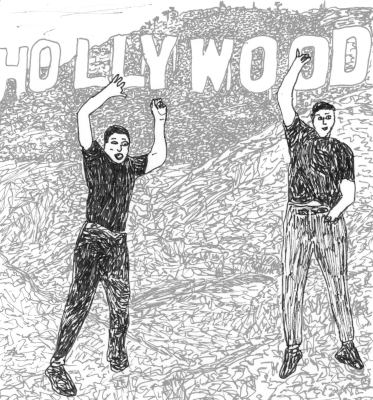 |
In Hollywood  |
À Hollywood  |
A Hollywood  |
En Hollywood  |
(Deutsch) Dies ist die linguistische Version der dreizehnten Staffel der Jungs. Die Texte sind dieselben wie auf der Hauptseite. |
(English) This is the linguistic version of the thirteenth season of the Boys. The texts are the same as on the main page. |
(Français) Voici la version linguistique de la treizième saison des Gars. Les textes sont les mêmes que sur la page principale. |
(Italiano) Questa è la versione linguistica la tredicesima stagione dei Ragazzi. I testi sono gli stessi della pagina principale. Colori: parole singole (verde) frasi nominali (azzurro) frasi verbali (ocra) modi di dire + collocazioni (rosso) parolacce + onomatopea + giochi di parole (viola) |
(Español) Esta es la versión lingüística de la decimotercera temporada de los Chicos. Los textos son los mismos que en la página principal. |
(English) The Boys and Maria enjoy themselves on the viewing platform of the Atomium in Brussels, a five-minute walk from Till's apartment. When he reunites with them there after his meeting, he presents a proposal that Helmut is enthusiastic about. Heinz less so. |
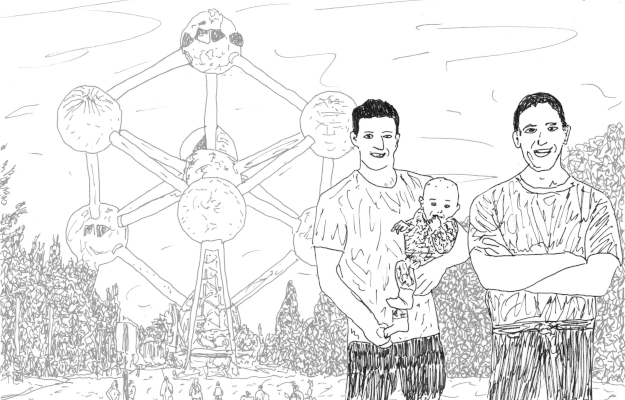 |
(Italiano) I Ragazzi e Maria passano il tempo sulla piattaforma panoramica dell'Atomium a Bruxelles, a cinque minuti a piedi dall'appartamento di Till. Quando li rivede lì dopo la sua riunione, fa una proposta che entusiasma Helmut, ma meno Heinz. |
(Deutsch) Die Jungs und Maria vertreiben sich die Zeit auf der Aussichtsplattform des Atomiums in Brüssel, fünf Fußminuten von Tills Wohnung entfernt. Als er sie nach seinem Meeting dort wiedersieht, bringt er einen Vorschlag mit, von dem Helmut begeistert ist. Heinz weniger. Normal Version | ||
Tag 1 Helmut: Nein, Mäuschen, nicht anfassen! Komm, wir gehen mal ein Stück zur Seite. So. Wipp wipp, ja, gleich geht's weiter, Süße. |
Day 1 Helmut: No, sweetie, don't touch that! Come on, let's move over a bit. So. Rock rock, yes, soon we'll be moving on, sweetie. |
Jour 1 Helmut : Non, ma puce, ne touche pas à ça ! Allez, on va se mettre un peu sur le côté. Voilà. Hop hop, oui, on va bientôt repartir, chérie. |
Giorno 1 Helmut: No, tesoro, non toccare quello! Dai, spostiamoci un po' di lato. Ecco. Dondola dondola, sì, tra poco si riparte, tesoro. |
Día 1 Helmut: No, cariño, ¡no toques eso! Vamos, apartémonos un poco. Así. Acun-acun, sí, pronto seguiremos adelante, cariño. |
2 Heinz: Hast du vielleicht erwartet, dass Maria normal wird? Bei den Eltern? Du musst sie nehmen, wie sie ist! Fördere sie, damit sie ihre Kräfte zu kontrollieren lernt. |
Heinz: Did you expect Maria to be normal? With parents like that? You have to take her as she is! Encourage her to learn to control her powers. |
Heinz : Tu t'attendais peut-être à ce que Maria devienne normale ? Avec des parents comme ça ? Tu dois l'accepter telle qu'elle est ! Encourage-la à apprendre à contrôler ses pouvoirs. |
Heinz: Ti aspettavi forse che Maria diventasse normale? Con genitori del genere? Devi accettarla così com'è! Incoraggiala a imparare a controllare i suoi poteri. |
Heinz: ¿Acaso esperabas que María se volviera normal? ¿Con unos padres así? ¡Tienes que aceptarla tal y como es! Anímala a aprender a controlar sus poderes. |
3 Heinz: Wo ist denn ...? Ah, da gehen sie. Also diese Maria! Was aus der wohl mal wird ... |
Heinz: Where is...? Ah, there they go. This Maria! I wonder what will become of her... |
Heinz : Où est... ? Ah, les voilà. Cette Maria ! Je me demande ce qu'elle va devenir... |
Heinz: Dove sono...? Ah, eccoli lì. Quella Maria! Mi chiedo cosa ne sarà di lei... |
Heinz: ¿Dónde está...? Ah, ahí van. ¡Esta María! Me pregunto qué será de ella... |
4 Heinz: Du hast telefoniert? Aha. Was, mit dem Produzenten von diesem Armageddon-Film? Ha ha, was schlägst du da vor? Ist das dein Ernst? Nein, ich glaub nicht, dass ... |
Heinz: You made a phone call? I see. What, with the producer of that Armageddon movie? Ha ha, what are you suggesting? Are you serious? No, I don't think that... |
Heinz : T'as passé un coup de fil ? Ah bon. Quoi, au producteur de ce film Armageddon ? Ha ha, qu'est-ce que tu proposes ? T'es sérieux ? Non, je ne pense pas que... |
Heinz: Hai fatto una telefonata? Ah, davvero. Cosa, al produttore del film Armageddon? Ah ah, cosa stai proponendo? Dici sul serio? No, non credo che... |
Heinz: ¿Has hecho una llamada? Ah, vale. ¿Al productor de la película Armageddon? Ja, ja, ¿qué propones? ¿Hablas en serio? No, no creo que... |
(English) While having a beer on the steps in front of Hedu's house, Heinz and Helmut demonstrate their friendship by weighing up the pros and cons of a trip to Hollywood, transparently, objectively, and with the necessary sensitivity. |
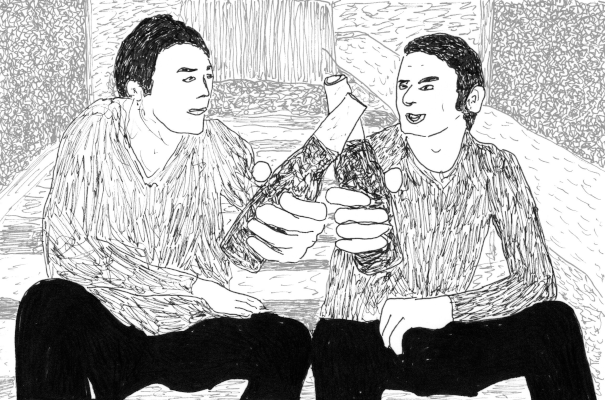 |
(Italiano) Mentre si godono una birra sui gradini davanti alla casa di Hedu, Heinz e Helmut dimostrano la loro amicizia discutendo i pro e i contro di un viaggio a Hollywood, in modo trasparente, oggettivo e con la necessaria sensibilità. |
(Deutsch) Während sie auf den Stufen vor Hedus Haus ein Bier trinken, beweisen Heinz und Helmut ihre Freundschaft, indem sie die Pros und Contras einer Hollywood-Reise gegeneinander abwägen, transparent, sachlich und mit dem erforderlichen Feingefühl. Normal Version | ||
Offene Worte Tag 2 1 Heinz: Hi Hedu! Alles klar? Geht's wieder besser? Ich hab gehört, dass ... Auaaa! |
Frank Words Day 2 Heinz: Hi Hedu! Everything okay? Is it better now? I heard that... Ouuuch! |
Des Mots francs Jour 2 Heinz : Salut Hédou ! Tout va bien ? Ça va mieux maintenant ? J'ai entendu dire que... Aïe ! |
Parole schiette Giorno 2 Heinz: Ciao Hedu! Tutto ok? Stai meglio adesso? Ho sentito che... Ahi! |
Palabras francas Día 2 Heinz: ¡Hola, Hedu! ¿Todo bien? ¿Ya te encuentras mejor? He oído que... ¡Ay! |
2 Helmut: Hey Carlo! Das ist Hedus Neffe, der da mit seinem Rad durch den Schlauchpark fährt. Carlo, ich werd in einem Hollywood-Film mitspielen! Ja, wirklich. |
Helmut: Hey Carlo! That's Hedu's nephew riding his bike through Hose Park. Carlo, I'm going to be in a Hollywood movie! Yes, really. |
Helmut : Hé Carlo ! C'est le neveu d'Hédou qui fait du vélo dans le Parc Tuyau. Carlo, je vais jouer dans un film hollywoodien ! Oui, vraiment. |
Helmut: Ehi Carlo! È il nipote di Hedu che va in bicicletta nel Parco Tubo. Carlo, reciterò in un film di Hollywood! Sì, davvero. |
Helmut: ¡Hola, Carlo! Es el sobrino de Hedu, que va en bicicleta por el Parque Manguera. Carlo, ¡voy a actuar en una película de Hollywood! Sí, de verdad. |
3 Heinz: Helmut, wenn du schauspielerst, bist du so peinlich wie ein übermütiger Vierzehnjähriger, der keine Ahnung von irgendwas hat, aber sich für den Größten hält. |
Heinz: Helmut, when you act, you're as embarrassing as a cocky fourteen-year-old who doesn't know anything but thinks he's the greatest. |
Heinz : Helmut, quand tu joues, tu es aussi embarrassant qu'un adolescent arrogant de 14 ans qui ne sait rien mais qui se prend pour le plus grand. |
Heinz: Helmut, quando reciti, sei imbarazzante come un quattordicenne presuntuoso che non sa nulla ma si crede il più grande. |
Heinz: Helmut, cuando actúas, eres tan vergonzoso como un adolescente engreído de catorce años que no sabe nada pero se cree el más grande. |
4 Heinz: Wenn wir in den USA arbeiten wollen, brauchen wir besondere Visa. |
Heinz: If we want to work in the US, we need special visas. |
Heinz : Si on veut bosser aux États-Unis, on a besoin de visas spéciaux. |
Heinz: Se vogliamo lavorare negli Stati Uniti, abbiamo bisogno di visti speciali. |
Heinz: Si queremos trabajar en Estados Unidos, necesitamos visados especiales. |
(English) Heinz witnesses Helmut's first homemade video. For Hollywood, he has ordered a starter kit for actors and unpacks it in front of the camera. When he is finished, Heinz shares his thoughts about the USA and Germany with him. |
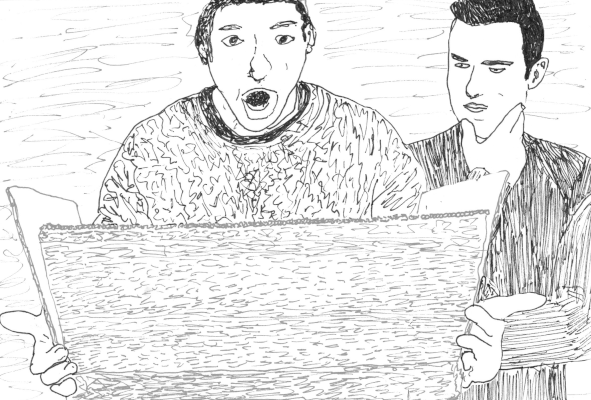 |
(Italiano) Heinz è testimone del primo video fatto da Helmut. Per il suo soggiorno a Hollywood, Helmut ha preso un kit per aspiranti attori e lo apre davanti alla telecamera. Una volta finito, Heinz gli racconta cosa pensa degli Stati Uniti e della Germania. |
(Deutsch) Heinz wird Zeuge von Helmuts erstem selbstgemachten Video. Für Hollywood hat er sich nämlich ein Starter-Set für Schauspieler bestellt und er packt es vor laufender Kamera aus. Als er damit fertig ist, teilt Heinz seine Gedanken über die USA und Deutschland mit ihm. Normal Version | ||
Tag 8 1 Heinz: ♪ Ich bin wieder da-ha! Macht total Spaß, mit dem neuen Roller durch die Gegend zu fahren. |
Day 8 Heinz: ♪ I'm ba-aaack! It's so much fun to ride around on the new scooter. |
Jour 8 Heinz : ♪ Je suis de retou-hour ! C'est trop cool de se balader avec le nouveau scooter. |
Giorno 8 Heinz: ♪ Sono di ritorno! È davvero divertente andare in giro con il nuovo scooter. |
Día 8 Heinz: ♪ ¡Ya estoy de vuelta! Es muy divertido conducir por la zona con la nueva motoneta. |
2 Helmut: Und was ist das? Aha, ein Schweißtuch mit Indiana-Jones-Motiv, sehr luxuriös. |
Helmut: And what's this? I see, a sweat cloth with an Indiana Jones motif, very luxurious. |
Helmut : Et ça, qu'est-ce que c'est ? Je vois, un chiffon pour la sueur avec un motif Indiana Jones, très luxueux. |
Helmut: E questo cos'è? Ah, un asciugamano con un motivo di Indiana Jones, molto lussuoso. |
Helmut: ¿Y qué es esto? Ya veo, una toalla con un motivo de Indiana Jones, muy lujosa. |
3 Heinz: Fertig? |
Heinz: Done? |
Heinz : C'est fini ? |
Heinz: Fatto? |
Heinz: ¿Terminado? |
4 Heinz: Hä, wie? Jedenfalls drängen sich inzwischen bei den wiederkehrenden Bildern von Verhungernden und von eingepferchten Menschenmassen, von Massenexekutionen und Erniedrigungen, leidenden Kindern, dieser ganzen riesigen sadistischen Gewaltorgie ... Vergleiche auf. |
Heinz: Huh, what? In any case, with the recurring images of starving and caged crowds, mass executions and humiliations, suffering children, this whole huge sadistic orgy of violence... comparisons come to mind. |
Heinz : Hein, comment ? En tout cas, avec les images récurrentes de foules affamées et enfermées, d'exécutions massives et d'humiliations, d'enfants qui souffrent, toute cette énorme orgie sadique de violence... des comparaisons viennent à l'esprit. |
Heinz: Eh, come? Comunque, con le immagini ricorrenti di folle affamate e rinchiuse, di esecuzioni di massa e umiliazioni, di bambini che soffrono, tutta questa enorme orgia sadica di violenza... vengono in mente dei confronti. |
Heinz: ¿Eh, cómo? En cualquier caso, las imágenes recurrentes de personas hambrientas y multitudes hacinadas, de ejecuciones masivas y humillaciones, de niños que sufren, de toda esta enorme orgía de violencia sádica... vienen a la mente algunas comparaciones. |
(English) The company FF PR is stabilizing. Five people are already working there, and the initial interview that Fanni and Fiona are about to attend could lead to another hire, as it concerns a very well-paid and long-term major contract. |
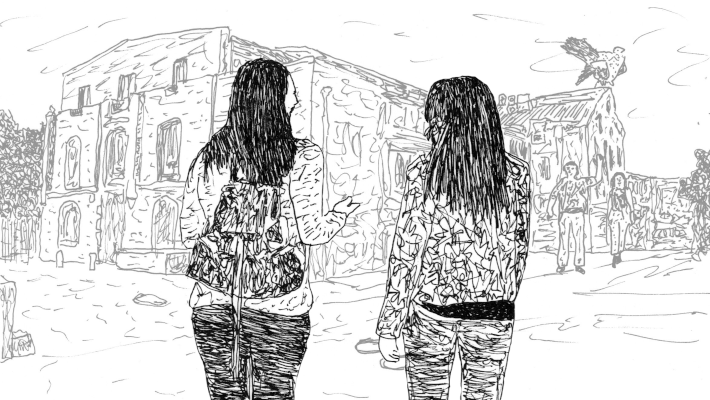 |
(Italiano) L'azienda FF PR sta diventando più stabile. Ci lavorano già cinque persone e il primo colloquio a cui Fanni e Fiona stanno andando potrebbe portare a un'altra assunzione, perché si tratta di un grosso incarico ben pagato e a lungo termine. |
(Deutsch) Die Firma FF PR stabilisiert sich. Schon arbeiten fünf Personen dort und das Erstgespräch, zu dem Fanni und Fiona unterwegs sind, könnte zu einer weiteren Einstellung führen, denn es geht um einen sehr gut bezahlten und dauerhaften Großauftrag. Normal Version | ||
Tag 8 1 Fanni: Ich bewundere immer wieder deine Entschlossenheit. Ich hätte das Erstgespräch auch allein führen können. |
Day 8 Fanni: I always admire your determination. I could have managed the initial meeting on my own. |
Jour 8 Fanni : J'adore ta détermination. J'aurais pu faire le premier rendez-vous toute seule. |
Giorno 8 Fanni: Ammiro sempre la tua determinazione. Avrei potuto fare il primo incontro da sola. |
Día 8 Fanni: Siempre admiro tu determinación. Yo podría haber llevado a cabo la primera entrevista sola. |
2 Fiona: OK, der Navi weist den Weg. Noch 1,3 Kilometer. Ich bin ja gespannt. Wenn das klappt, können wir einen zusätzlichen Texter einstellen. Dann sind wir schon zu sechst in der Agentur. |
Fiona: OK, the satnav is showing the way. Another 1.3 kilometers. I can't wait. If it works out, we can hire an additional copywriter. Then there will be six of us in the agency. |
Fiona : OK, le GPS nous indique le chemin. Encore 1,3 kilomètre. J'ai hâte. Si ça marche, on pourra embaucher un rédacteur supplémentaire. On sera alors six dans l'agence. |
Fiona: Ok, il navigatore ci indica la strada. Ancora 1,3 chilometri. Sono curiosa. Se tutto va bene, potremo assumere un altro copywriter. Allora saremo in sei nell'agenzia. |
Fiona: Vale, el GPS nos indica el camino. Otros 1,3 kilómetros. Estoy intrigada. Si sale bien, podremos contratar a otro copywriter. Entonces seremos seis en la agencia. |
3 Fiona: Herr Lehmann, hallo! Ja, ganz recht, Fiona und Fanni von FF PR. Hallo Leonie! |
Fiona: Herr Lehmann, hello! Yes, that's right, Fiona and Fanni from FF PR. Hello Leonie! |
Fiona : Herr Lehmann, bonjour ! Oui, c'est ça, Fiona et Fanni de FF PR. Salut Leonie ! |
Fiona: Herr Lehmann, ciao! Sì, esatto, Fiona e Fanni della FF PR. Ciao Leonie! |
Fiona: ¡Herr Lehmann, buenas tardes! Sí, así es, Fiona y Fanni, de FF PR. ¡Hola, Leonie! |
4 Fanni: Ja, woher ...? Ach so, Leonie hat Ihnen das erzählt. Ja, stimmt, ich stell lebensechte Modelle von Frühmenschen her. Klar hab ich Fotos dabei, Moment. |
Fanni: Yes, how did you... Oh, Leonie told you. Yes, that's right, I make lifelike models of early humans. Sure I have photos with me, just a moment. |
Fanni : Oui, d'où... ? Ah oui, c'est Leonie qui vous en a parlé. Ouais, c'est vrai, je fabrique des modèles réalistes d'hommes préhistoriques. Bien sûr que j'ai des photos, attendez. |
Fanni: Sì, come mai...? Ah, è stata Leonie a dirglielo. Sì, è vero, realizzo modelli realistici dei primi esseri umani. Certo che ho delle foto con me, un momento. |
Fanni: Sí, ¿de dónde...? Ah, Leonie le ha contado eso. Sí, es cierto, realizo modelos realistas de los primeros seres humanos. Claro que tengo fotos conmigo, un momento. |
(English) The Boys have arrived in Burbank, California, and meet their contact Jeff at a diner to discuss the first day of filming. Neither of the two seems to have any trouble integrating into their new surroundings. |
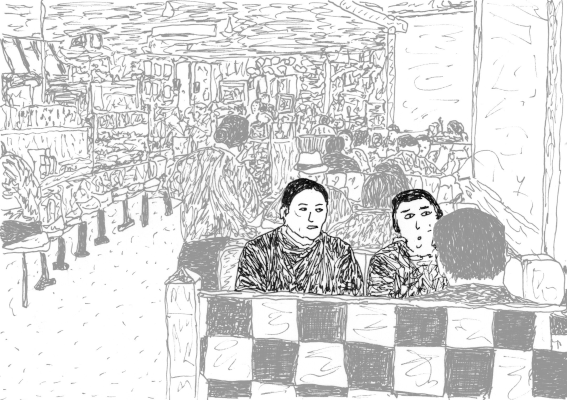 |
(Italiano) I Ragazzi sono arrivati a Burbank, in California, e si incontrano al diner con il loro referente Jeff per discutere il primo giorno di riprese. Nessuno dei due sembra avere difficoltà a integrarsi nel nuovo ambiente. |
(Deutsch) Die Jungs sind in Burbank, Kalifornien, angekommen und treffen sich im Diner mit ihrer Kontaktperson Jeff, um den ersten Filmdrehtag zu besprechen. Keiner der beiden scheint Mühe damit zu haben, sich in die neue Umgebung zu integrieren. Normal Version | ||
Tag 11 1 Helmut: REDEST du mit mir? Nee. Ähem: Redest DU mit MIR? Noch mal: Redest ...? |
Day 11 Helmut: You TALKING to me? No. Ahem: YOU talking to ME? Again: You talking...? |
Jour 11 Helmut : C'EST à moi que tu parles ? Non. Ahem : C'est à MOI que TU parles ? Encore une fois: c'est à
? |
Giorno 11 Helmut: PARLI con me? No. Ehem: Parli CON me? Di nuovo: Parli...? |
Día 11 Helmut: ¿Me ESTÁS hablando a mí? No. Ejem: ¿ME estás hablando a MÍ? De nuevo: ¿Me estás...? |
2 Heinz: Die ... Schauspielerin? |
Heinz: The... actress? |
Heinz : L'
actrice ? |
Heinz: L'... attrice? |
Heinz: ¿La... actriz? |
3 Helmut: Oh Heinz, bitte! In den USA benimmt man sich freundlich. Oberflächlich, aber freundlich. Denk an deinen Kodex! |
Helmut: Oh Heinz, please! In the US, people behave in a friendly manner. Superficial, but friendly. Remember your code! |
Helmut : Oh Heinz, s'il te plaît ! Aux États-Unis, les gens se comportent de manière amicale. Superficielle, mais amicale. Souviens-toi de ton code ! |
Helmut: Oh Heinz, per favore! Negli Stati Uniti, le persone si comportano in modo amichevole. Superficiale, ma amichevole. Ricorda il tuo codice! |
Helmut: ¡Oh, Heinz, por favor! En Estados Unidos, la gente se comporta de manera amistosa. Superficial, pero amistosa. ¡Piensa en tu código! |
4 Helmut: „Motherfucker!!” So? Nein, du doch nicht, Sibyl! Das ist meine Rolle. Ja ja, wir machen Filme und so. Aber wir sind noch nicht sehr bekannt. Deshalb sind wir ja hier. Also, nicht hier im Diner, ich meine ... |
Helmut: "Motherfucker!!" Like this? No, not you, Sibyl! That's my role. Yes, yes, we make movies and stuff. But we're not very well known yet. That's why we're here. Well, not here in the diner, I mean... |
Helmut : « Motherfucker !! » Comme ça ? Non, pas toi, Sibyl ! C'est mon rôle. Oui, oui, on fait des films et tout ça. Mais on n'est pas encore très connus. C'est pour ça qu'on est ici. Enfin, pas ici dans le diner, je veux dire... |
Helmut: "Motherfucker!!" Così? No, non tu, Sibyl! È il mio ruolo. Sì, sì, facciamo film e tutto il resto. Ma non siamo ancora molto famosi. È per questo che siamo qui. Beh, non qui al diner, intendo... |
Helmut: "¡¡Motherfucker!!". ¿Así? No, tú no, Sibyl. Ese es mi papel. Sí, sí, hacemos películas y esas cosas. Pero aún no somos muy conocidos. Por eso estamos aquí. Bueno, no aquí en el diner, quiero decir... |
(English) As a newbie and career changer, you can't be picky. Helmut knows this, and he has a cunning plan. First of all, he has to play along and do well in his first roles. This isn't easy, but Helmut is ambitious. |
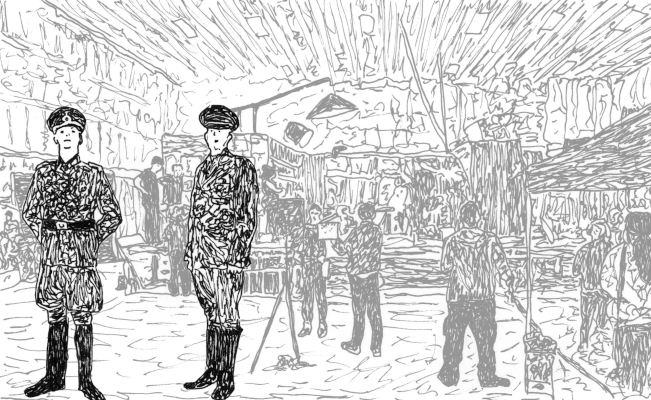 |
(Italiano) In qualità di principiante e cambiante di carriera, non si può essere esigenti. Helmut ne è consapevole e ha un piano ingegnoso. Innanzitutto, deve partecipare al gioco e svolgere bene i suoi primi ruoli. Non è semplice, ma Helmut è ambizioso. |
(Deutsch) Als Neuling und als Quereinsteiger darf man nicht wählerisch sein. Helmut weiß das und er hat einen raffinierten Plan. Zunächst einmal muss er das Spiel mitmachen und seine ersten Rollen gut spielen. Das ist nicht leicht, aber Helmut ist ehrgeizig. Normal Version | ||
Tag 12 1 Helmut: In diesem Kostüm fühlt man sich wie ein anderer Mensch. So herrschaftlich! |
Day 12 Helmut: This costume makes you feel like a different person. So stately! |
Jour 12 Helmut : Dans ce costume, on se sent comme une autre personne. Tellement majestueux ! |
Giorno 12 Helmut: Con questo costume ti senti una persona diversa. Così maestoso! |
Día 12 Helmut: Con este traje te sientes como otra persona. ¡Tan majestuoso! |
2 Heinz: Also: Wenn wir Polen eingenommen haben, folgt Frankreich und am Ende schnappen wir uns den russischen Bären! Wir werden Stalin schon zeigen, wer der Herr im Haus ist. Ha! |
Heinz: So: Once we've invaded Poland, France will follow, and in the end we'll grab the Russian bear! We'll certainly show Stalin who's boss. Ha! |
Heinz : Donc : une fois qu'on aura pris la Pologne, on s'occupera de la France et à la fin, on s'emparera de l'ours russe ! On montrera à Staline qui est le maître ici. Ha ! |
Heinz: Quindi: una volta conquistata la Polonia, seguirà la Francia e alla fine ci impadroniremo dell'orso russo! Faremo vedere a Stalin chi comanda. Ah! |
Heinz: Entonces: una vez que hayamos conquistado Polonia, le seguirá Francia y, al final, ¡atraparemos al oso ruso! Le demostraremos a Stalin quién manda aquí. ¡Ja! |
3 Heinz: Lass mich jetzt mal auf dem Stuhl sitzen! Wir wechseln uns ab. |
Heinz: Let me sit on the chair now! We take turns. |
Heinz : Laisse-moi m'asseoir sur la chaise maintenant ! On va se relayer. |
Heinz: Lasciami sedere sulla sedia adesso! Facciamo a turno. |
Heinz: ¡Déjame sentarme en la silla ahora! Vamos a turnarnos. |
4 Helmut: Ja, das ist ... Pock pock prügel plumps prügel kick. Auaaa! Stöhn |
Helmut: Yes, that's... pock pock punch thump beat kick. Ouch! Groan |
Helmut : Oui, c'est... Poc poc frappe tabasse kick. Aïe ! Gémis |
Helmut: Sì, è... poc poc pugno patapum picchia calcio. Ahi! Gemito |
Helmut: Sí, eso es... poc poc golpe batacaz paliza patada. ¡Ay! Gemido |
(English) After a strenuous day of filming, the Boys relax at home and reflect on the reason why they came to Hollywood. Helmut needs a little guidance on this issue. He also needs frozen peas for his face. |
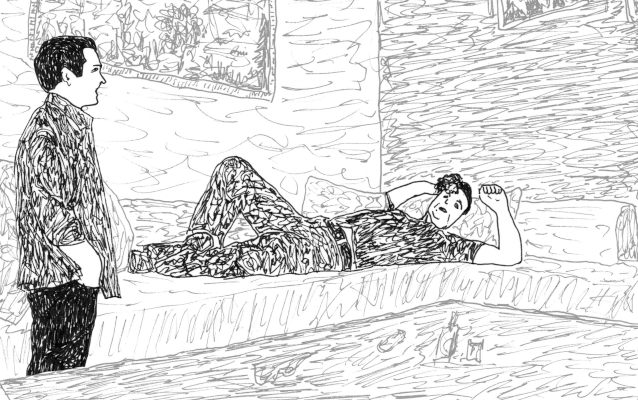 |
(Italiano) Dopo un'intensa giornata di riprese, i Ragazzi si riposano a casa e riflettono sul motivo per cui sono venuti a Hollywood. Helmut necessita di un po' di orientamento in merito a questa questione. Inoltre, necessita di piselli surgelati per il suo viso. |
(Deutsch) Nach einem anstrengenden Drehtag ruhen sich die Jungs zu Hause aus und besinnen sich auf den Grund, aus dem sie nach Hollywood gekommen sind. Helmut braucht in dieser Frage ein wenig Orientierung. Außerdem braucht er Tiefkühlerbsen für sein Gesicht. Normal Version | ||
Tag 12 1 Heinz: Du hast Glück, da waren Erbsen im Eisfach. Hier, leg das auf dein Gesicht, das kühlt. |
Day 12 Heinz: You're lucky. There were peas in the freezer. Here, put this on your face, it will cool you down. |
Jour 12 Heinz : T'as de la chance. Il y avait des petits pois dans le congélateur. Tiens, mets ça sur ton visage, ça va te rafraîchir. |
Giorno 12 Heinz: Sei fortunato. C'erano dei piselli nel congelatore. Ecco, metti questo sulla faccia, ti darà un po' di sollievo. |
Día 12 Heinz: Tienes suerte. Había guisantes en el congelador. Toma, ponte esto en la cara, te va a refrescar. |
2 Helmut: Findest du? Du, wieso sagen die Amis eigentlich jedes Mal „so”, bevor sie eine Frage beantworten? |
Helmut: You think so? By the way, why do Americans always say "so" before they answer a question? |
Helmut : Tu trouves ? Au fait, pourquoi les Américains disent-ils toujours « so » avant de répondre à une question ? |
Helmut: Lo pensi? A proposito, perché gli americani dicono sempre "so" prima di rispondere a una domanda? |
Helmut: ¿Tú crees? Por cierto, ¿por qué los estadounidenses siempre dicen "so" antes de responder a una pregunta? |
3 Heinz: Helmut, wir ... |
Heinz: Helmut, we... |
Heinz : Helmut, on... |
Heinz: Helmut, noi... |
Heinz: Helmut, nosotros... |
4 Helmut: Was? Aber wie ...? Wie hast du das gemacht? |
Helmut: What? But how...? How did you do that? |
Helmut : Quoi ? Mais comment... ? Comment t'as fait ça ? |
Helmut: Cosa? Ma come...? Come hai fatto? |
Helmut: ¿Qué? Pero ¿cómo...? ¿Cómo lo has hecho? |
(English) Their second film appearance again fails to fully meet expectations. But instead of being deterred, Helmut immediately rushes to the next location. There he proves his talent, even though unfortunately there is no camera nearby to capture it. |
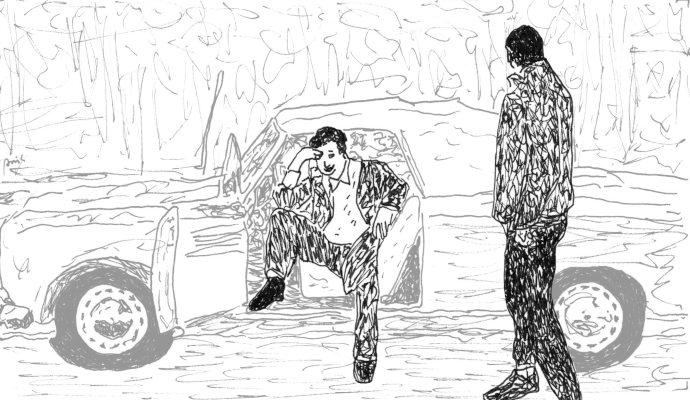 |
(Italiano) Anche la loro seconda apparizione cinematografica non soddisfa del tutto le aspettative. Ma invece di lasciarsi abbattere, Helmut si precipita subito nella scena successiva. Lì dimostra il suo talento, anche se purtroppo non c'è nessuna telecamera nelle vicinanze per immortalarlo. |
(Deutsch) Auch ihr zweiter Filmauftritt erfüllt die Erwartungen nicht vollständig. Statt sich aber davon unterkriegen zu lassen, eilt Helmut sogleich zum nächsten Schauplatz. Dort beweist er sein Talent, auch wenn leider keine Kamera in der Nähe ist, um es festzuhalten. Normal Version | ||
Tag 13 1 Helmut: Ha! Son of a bitch! Was ist? Wieso Cut? War doch gut! Also, ich fand's dieses Mal gut. |
Day 13 Helmut: Ha! Son of a bitch! What's up? Why cut? That was good! Well, I thought it was good this time. |
Jour 13 Helmut : Ha ! Son of a bitch ! Qu'est-ce qui se passe ? Pourquoi coupez ? Mais c'était bien ! Enfin, moi, j'ai trouvé ça bien cette fois-ci. |
Giorno 13 Helmut: Ah! Son of a bitch! Che succede? Perché hai detto "Cut"? Ma era bello! Insomma, a me questa volta è piaciuto. |
Día 13 Helmut: ¡Ja! ¡Son of a bitch! ¿Qué pasa? ¿Por qué corten? ¡Pero si estaba bien! A mí me ha gustado esta vez. |
2 Heinz: Als nächstes kommt nur noch die Schlussszene in den Nazi-Uniformen, wenn du erschossen wirst. Das kriegst du hin. Einfach umfallen, wenn du den Schuss hörst. Ob uns danach noch mal was angeboten wird, ist angesichts unserer bisherigen Leistung allerdings fraglich. |
Heinz: The only thing left is the final scene in Nazi uniforms, when you get shot. You can do that. Just fall down when you hear the shot. Whether we'll be offered anything else after that is questionable, given our performance so far. |
Heinz : La prochaine étape, c'est juste la scène finale en uniformes nazis, quand tu te fais tirer dessus. Tu y arriveras. Il suffit de t'effondrer quand tu entends le coup de feu. Vu nos performances jusqu'à présent, on peut se demander si on nous proposera autre chose après ça. |
Heinz: L'unica cosa che resta è la scena finale in uniforme nazista, quando ti sparano. Ce la puoi fare. Basta che cadi a terra quando senti lo sparo. Viste le nostre performance finora, c'è da chiedersi se ci proporranno qualcos'altro dopo questo. |
Heinz: Lo único que queda es la escena final con los uniformes nazis, cuando te disparan. Tú puedes hacerlo. Solo tienes que tirarte al suelo cuando oigas el disparo. Teniendo en cuenta nuestras actuaciones hasta ahora, cabe preguntarse si nos ofrecerán algo más después de esto. |
3 Helmut: Moment, ich heb das ... ächz flip. So, die Beifahrertür ist offen. Steig ein! |
Helmut: Wait, I'll lift the... groan flip. There, the passenger door is unlocked. Get in! |
Helmut : Attends, je vais soulever la... gémi flip. Voilà, la porte passager est déverrouillée. Monte ! |
Helmut: Aspetta, sollevo la... geme flip. Ecco, la portiera del passeggero è sbloccata. Sali! |
Helmut: Espera, voy a levantar la... gemi flip. Ya está, la puerta del copiloto está desbloqueada. ¡Sube! |
4 Helmut: Ich hab nicht alle Folgen gesehen, aber ... Ihr wollt euch reinsetzen? Also, ich weiß nicht. Der ist gerade erst gereinigt worden. |
Helmut: I haven't seen all the episodes, but... You want to sit in it? Well, I don't know. It's just been cleaned. |
Helmut : Je n'ai pas vu tous les épisodes, mais... Vous voulez vous asseoir dedans ? Eh bien, je ne sais pas. Elle vient d'être nettoyée. |
Helmut: Non ho visto tutte le puntate, ma... Volete sedervi dentro? Beh, non lo so. È stata appena pulita. |
Helmut: No he visto todos los episodios, pero... ¿Queréis sentaros? Bueno, no sé. Acaban de limpiarlo. |
(English) Courtyard apartments with shared courtyards are a typical feature of Los Angeles architecture. In their free time, neighbors sometimes sit together and enjoy the Californian lifestyle by the pool. The Boys also get to experience this. |
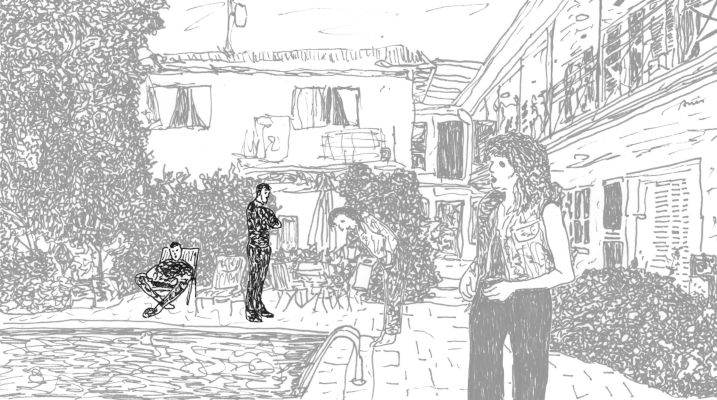 |
(Italiano) Gli "courtyard apartments" con cortili interni condivisi dai residenti sono tipici dell'architettura di Los Angeles. Nel tempo libero, i vicini a volte si ritrovano insieme e si godono la vita californiana a bordo piscina. Anche i Ragazzi vivono questa esperienza. |
(Deutsch) „Courtyard Apartments” mit Innenhöfen, die sich die Anwohner teilen, gehören zur typischen Architektur in Los Angeles. In ihrer Freizeit sitzen die Nachbarn manchmal zusammen und genießen das kalifornische Leben am Pool. Diese Erfahrung machen auch die Jungs. Normal Version | ||
Der rote Pool Tag 13 1 Helmut: So, da wären wir! Home, sweet home. Peng peng rumpel knatter peng |
The Red Pool Day 13 Helmut: So, here we are! Home, sweet home. Bang bang rumble clatter bang |
La Piscine rouge Jour 13 Helmut : Voilà, on y est ! Home sweet home. Pan pan vroum vromb' pan |
La Piscina rossa Giorno 13 Helmut: Eccoci qui! Casa dolce casa. Pum pum brum brum pum |
La Piscina roja Día 13 Helmut: ¡Ya estamos aquí! Hogar, dulce hogar. Pum pum raca trac pum |
2 Heinz: Ich bin besonders an dem Drehbuchschreiber interessiert, diesem Jordan, und an dem Schauspieler, der im Film den Agenten David Miles gespielt hat. Weißt du, wie der heißt? |
Heinz: I'm particularly interested in the screenwriter, this Jordan, and the actor who played the agent David Miles in the film. Do you know his name? |
Heinz : Je m'intéresse particulièrement au scénariste, ce Jordan, et à l'acteur qui a joué l'agent David Miles dans le film. Tu sais comment il s'appelle ? |
Heinz: Mi interessa soprattutto lo sceneggiatore, questo Jordan, e l'attore che ha interpretato l'agente David Miles nel film. Sai come si chiama? |
Heinz: Me interesa especialmente el guionista, ese tal Jordan, y el actor que interpretó al agente David Miles en la película. ¿Sabes cómo se llama? |
3 Helmut: Du übertreibst in gigantischen Ausmaßen! Wir sind neu hier und müssen uns anpassen! Was würde es für einen Eindruck machen, wenn wir die Leute anklagen, weil sie den Genozid in Gaza finanzieren und den ganzen anderen Scheiß. |
Helmut: You're exaggerating on a gigantic scale! We're new here and we have to adapt! What kind of impression would it make if we accused people of financing the genocide in Gaza and all that other crap? |
Helmut : Tu exagères de manière gigantesque ! On est nouveaux ici et on doit s'adapter ! Quelle impression ça ferait si on accusait les gens de financer le génocide à Gaza et toutes les autres conneries ? |
Helmut: Stai esagerando in modo gigantesco! Siamo nuovi qui e dobbiamo adattarci! Che impressione daremmo se accusassimo la gente di finanziare il genocidio a Gaza e tutte le altre stronzate? |
Helmut: ¡Estás exagerando hasta proporciones gigantescas! ¡Somos nuevos aquí y tenemos que adaptarnos! ¿Qué impresión causaríamos si acusáramos a la gente de financiar el genocidio en Gaza y toda esa mierda? |
4 Helmut: Ich nehme an, dass ein verwundeter Coyote im Pool ertrunken ist. Oder ein Waschbär. Von solchen Fällen hört man immer wieder. Tragisch, tragisch. |
Helmut: I assume that a wounded coyote drowned in the pool. Or a raccoon. You hear about cases like that all the time. Tragic, tragic. |
Helmut : Je suppose qu'un coyote blessé s'est noyé dans la piscine. Ou un raton laveur. On entend tout le temps parler de cas comme ça. Tragique, tragique. |
Helmut: Immagino che un coyote ferito sia annegato nella piscina. O un procione. Si sente spesso di casi del genere. Tragico, tragico. |
Helmut: Supongo que un coyote herido se ahogó en la piscina. O un mapache. Se oyen casos así todo el tiempo. Trágico, trágico. |
(English) When visiting producer Dan Sherman, who invited them to Hollywood, the Boys admire the exotic garden. Helmut makes every effort to impress, because he doesn't want to miss this opportunity, and the result is quite something. |
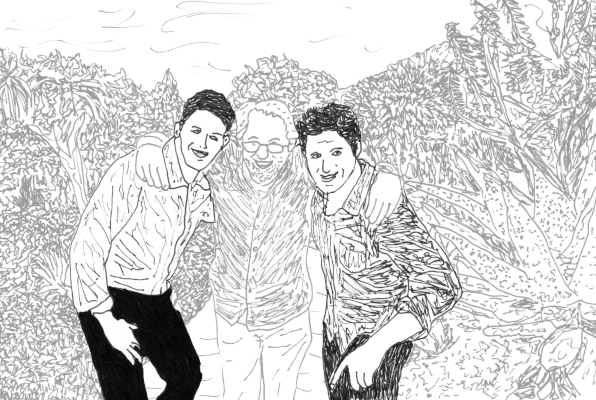 |
(Italiano) Durante la visita al produttore Dan Sherman, che li ha invitati a Hollywood, i Ragazzi si godono il giardino esotico. Helmut fa di tutto per fare bella figura, perché non vuole perdere questa occasione, e il risultato è davvero notevole. |
(Deutsch) Beim Besuch des Produzenten Dan Sherman, der sie nach Hollywood eingeladen hat, bewundern die Jungs den exotischen Garten. Helmut gibt sich alle Mühe, Eindruck zu schinden, denn er will die Gelegenheit nicht verpassen, und das Resultat lässt sich sehen. Normal Version | ||
Dans Garten Tag 14 1 Helmut: Oh, schon wieder das Handy. Nein nein, wir wissen, dass du ein beschäftigter Hollywood-Produzent bist, alles in Ordnung. |
Dan's Garden Day 14 Helmut: Oh, the cell phone again. No, no, we know you're a busy Hollywood producer, it's fine. |
Le Jardin de Dan Jour 14 Helmut : Oh, encore le portable. Non, non, on sait que t'es un producteur hollywoodien super occupé, c'est pas grave. |
Il Giardino di Dan Giorno 14 Helmut: Oh, di nuovo il cellulare. No, no, sappiamo che sei un produttore di Hollywood molto impegnato, va bene così. |
El Jardín de Dan Día 14 Helmut: Oh, otra vez el móvil. No, no, sabemos que eres un productor de Hollywood muy ocupado, no pasa nada. |
2 Heinz: Sibyl! |
Heinz: Sibyl! |
Heinz : Sibyl ! |
Heinz: Sibyl! |
Heinz: ¡Sibyl! |
3 Helmut: Peter Schack. Na warte ... Ich hatte ja keine Ahnung. |
Helmut: Peter Schack. Just you wait... I had no idea. |
Helmut : Peter Schack. Attends un peu... Je n'en avais aucune idée. |
Helmut: Peter Schack. Aspetta e vedrai... Non ne avevo idea. |
Helmut: Peter Schack. Espera y verás... No tenía ni idea. |
4 Heinz: Toller Garten, übrigens. Man spürt, dass er dir viel bedeutet. |
Heinz: Great garden, by the way. One can tell it means a lot to you. |
Heinz : Superbe jardin, au fait. On voit qu'il compte beaucoup pour toi. |
Heinz: Bellissimo giardino, a proposito. Si vede che ci tieni molto. |
Heinz: Por cierto, qué jardín tan bonito. Se nota que significa mucho para ti. |
(English) The Boys use their days off to explore the surrounding area. Today they are going to the world-famous Hollywood Walk of Fame, where Helmut has some business to attend to. Heinz helps him and is once again amazed by his friend's talents. |
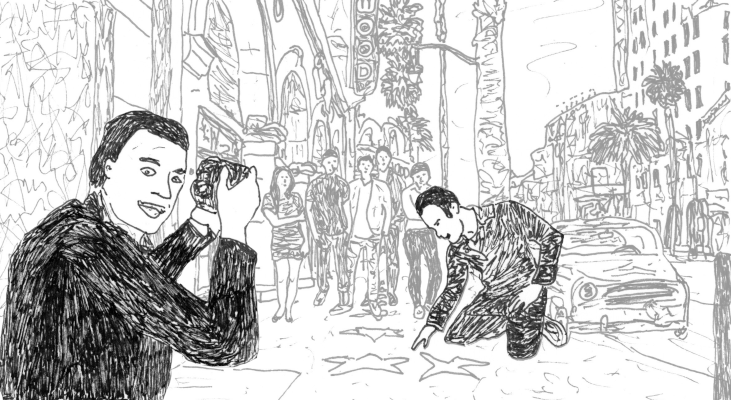 |
(Italiano) I Ragazzi usano i loro giorni liberi per esplorare i dintorni. Oggi vanno alla famosa Hollywood Walk of Fame, dove Helmut ha qualcosa da fare. Heinz lo aiuta e si stupisce ancora una volta dei talenti del suo amico. |
(Deutsch) Die Jungs nutzen ihre freien Tage, um die Umgebung zu erkunden. Heute fahren sie zum weltberühmten Hollywood Walk of Fame, wo Helmut etwas erledigen will. Heinz hilft ihm dabei und staunt ein weiteres Mal über die Talente seines Freundes. Normal Version | ||
Walk of Fame Tag 17 1 Helmut: Hab ich nicht gesagt, dass ich einen Parkplatz mitten auf dem Hollywood Walk of Fame finde? Und voilà Papa! Peng knatter peng rödel rödel tsch |
Walk of Fame Day 17 Helmut: Didn't I say I'd find a parking spot right in the middle of the Hollywood Walk of Fame? And voilà, papa! Bang clatter bang yodle yodle tsh |
Walk of Fame Jour 17 Helmut : Je t'avais bien dit que je trouverais une place de parking en plein milieu du Hollywood Walk of Fame ! Et voilà, papa ! Pam crepit pam iodl dodl tch |
Walk of Fame Giorno 17 Helmut: Non ti avevo detto che avrei trovato un parcheggio proprio nel bel mezzo della Hollywood Walk of Fame? E voilà, papà! Bang crepit bang yodl dodl tsh |
Walk of Fame Día 17 Helmut: ¿No te dije que encontraría un lugar para estacionar en medio del Paseo de la Fama de Hollywood? ¡Y voilà, papá! Bum crepit bum yoodl doodl tsh |
2 Heinz: Ich wünschte nur, wir würden in der Holger-Sache weiterkommen! Kannst du nicht deine Methode einsetzen, so wie am Mittwoch bei Dan im Garten, als du die Brosche seiner Tochter wiedergefunden hast? Behalt das bitte im Kopf und denk nicht nur an deine Karriere. |
Heinz: I just wish we could make some progress on the Holger case! Can't you use your method, like you did on Wednesday in Dan's garden when you found his daughter's brooch? Please keep that in mind and don't just think about your career. |
Heinz : J'aimerais juste qu'on avance un peu dans l'affaire Holger ! Tu ne peux pas utiliser ta méthode, comme tu l'as fait mercredi dans le jardin de Dan quand tu as trouvé la broche de sa fille ? Garde ça en tête et ne pense pas seulement à ta carrière. |
Heinz: Vorrei solo che facessimo qualche progresso nel caso Holger! Non puoi usare il tuo metodo, come hai fatto mercoledì nel giardino di Dan quando hai trovato la spilla di sua figlia? Tienilo a mente e non pensare solo alla tua carriera. |
Heinz: ¡Solo quiero que avancemos en el caso de Holger! ¿No puedes usar tu método, como hiciste el miércoles en el jardín de Dan cuando encontraste el broche de su hija? Tenlo en cuenta, por favor, y no pienses solo en tu carrera. |
3 Heinz: Die Leute denken, dass wir hier was Offizielles machen und halten respektvoll Abstand. Wenn du nicht gerade vor einer Kamera stehst, bist du ein ganz guter Schauspieler. |
Heinz: People think we're doing something official here and keep a respectful distance. When you're not in front of a camera, you're a pretty good actor. |
Heinz : Les gens pensent qu'on fait quelque chose d'officiel ici et gardent une distance respectueuse. Quand tu n'es pas devant la caméra, tu joues plutôt bien. |
Heinz: La gente pensa che stiamo facendo qualcosa di ufficiale e mantiene una distanza rispettosa. Quando non sei davanti alla telecamera, sei un attore piuttosto bravo. |
Heinz: La gente cree que estamos haciendo algo oficial y mantiene una distancia respetuosa. Cuando no estás delante de una cámara, eres un actor bastante bueno. |
4 Heinz: Ich geh noch mal einen Meter zurück, wegen der Perspektive. Klick klick. Hm, wir haben offenbar ein paar Schaulustige angelockt. Sieht aus wie ein Fanclub, da hinter dir beim Auto. |
Heinz: I'm going to take a step back for the perspective. Click click. Hmm, we've obviously attracted a few onlookers. Looks like a fan club behind you by the car. |
Heinz : Je vais reculer d'un mètre pour la perspective. Clic clic. Hmm, on a apparemment attiré quelques badauds. On dirait un fan club derrière toi, près de la voiture. |
Heinz: Faccio un passo indietro per avere una prospettiva migliore. Clic clic. Hm, a quanto pare abbiamo attirato alcuni curiosi. Sembra un fan club, lì dietro di te vicino alla macchina. |
Heinz: Voy a retroceder un metro, por la perspectiva. Clic clic. Hm, parece que hemos atraído a algunos curiosos. Como un club de fans, ahí detrás de ti, junto al coche. |
(English) Before Heinz and Helmut shoot their final scene, it becomes clear that some tension has built up during their time in Hollywood, because it unexpectedly erupts. And that is by no means the only unexpected thing. |
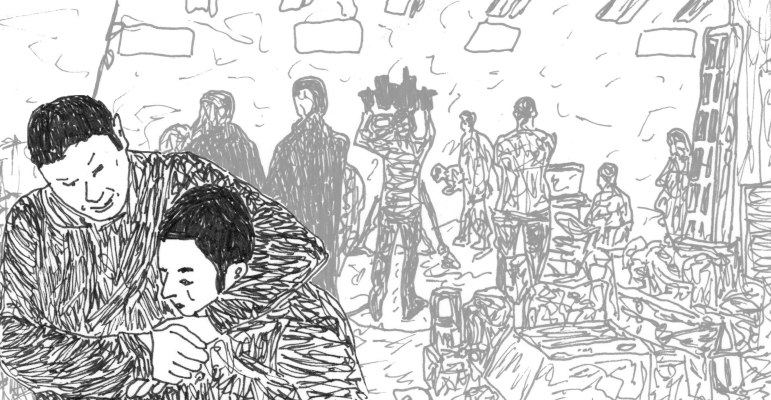 |
(Italiano) Prima dell'ultima scena che Heinz e Helmut devono girare, si vede che durante il loro tempo a Hollywood si è accumulato un sacco di tensione, perché esplode inaspettatamente. E questa non è affatto l'unica cosa inaspettata. |
(Deutsch) Vor der letzten Szene, die Heinz und Helmut zu drehen haben, zeigt sich, dass sich während ihrer Zeit in Hollywood einige Aggressionen aufgestaut haben, denn sie brechen unerwartet aus. Und das ist bei Weitem nicht das Einzige, das unerwartet ist. Normal Version | ||
Tag 19 1 Heinz: Helmut, oh Gott, was ist passiert? Warum bist du auf den Boden gefallen? Hast du Schmerzen? |
Day 19 Heinz: Helmut, oh my goodness, what happened? Why did you fall on the floor? Are you hurt? |
La Percée Jour 19 Heinz : Helmut, oh mon Dieu, qu'est-ce qui s'est passé ? Pourquoi t'es tombé par terre ? T'as mal quelque part ? |
Giorno 19 Heinz: Helmut, oh Dio, che è successo? Perché sei caduto per terra? Ti fa male qualcosa? |
Día 19 Heinz: Helmut, Dios mío, ¿qué ha pasado? ¿Por qué te has caído al suelo? ¿Te duele algo? |
2 Heinz: Ey, was hab ich denn gesagt? |
Heinz: Hey, what did I say? |
Heinz : Hé, qu'est-ce que j'ai dit ? |
Heinz: Ehi, cosa ho detto? |
Heinz: Oye, ¿qué he dicho? |
3 Helmut: Aber klar. Siehst du diesen Finger? |
Helmut: But of course. See this finger? |
Helmut : Bien sûr. Tu vois ce doigt ? |
Helmut: Ma certo. Vedi questo dito? |
Helmut: Por supuesto. ¿Ves este dedo? |
4 Heinz: Aua! Mann, hier oben sind überall Scheinwerfer! Und die sind verdammt heiß! |
Heinz: Ouch! Man, there are spotlights everywhere up here! And they're damn hot! |
Heinz : Aïe ! Mec, il y a des projecteurs partout ici ! Et ils sont super chauds ! |
Heinz: Ahi! Cavolo, ci sono riflettori ovunque quassù! E sono dannatamente caldi! |
Heinz: ¡Ay! ¡Tío, aquí arriba hay focos por todas partes! ¡Y están muy calientes! |
(English) After Heinz has informed producer Dan Sherman about the latest developments, everyone involved meets in the conference room at Sam Slam Studios to negotiate a contract. The Boys are wide awake and focused on the task at hand. |
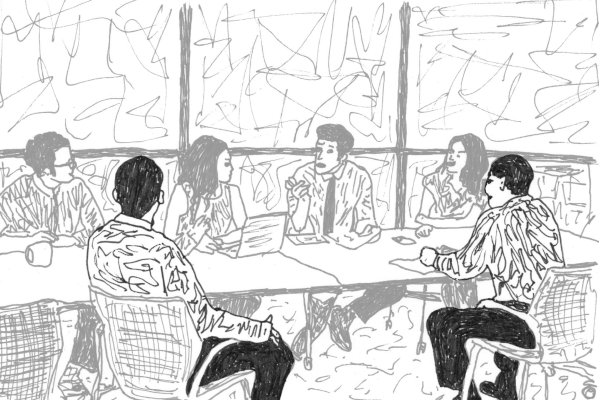 |
(Italiano) Dopo che Heinz ha aggiornato il produttore Dan Sherman sugli ultimi sviluppi, tutti si ritrovano nella sala riunioni dei Sam Slam Studios per discutere il contratto. I Ragazzi sono super concentrati e pronti a dare il massimo. |
(Deutsch) Nachdem Heinz den Produzenten Dan Sherman über die neusten Entwicklungen informiert hat, treffen sich alle Beteiligten in den Sam Slam Studios im Konferenzzimmer, um einen Vertrag auszuhandeln. Die Jungs sind hellwach und konzentriert bei der Sache. Normal Version | ||
Verhandlungen Tag 20 1 Heinz: Ah, Dan, schön, dass du es so kurzfristig einrichten konntest. Sam Slam kennst du ja sicher schon. Klar. Ja, ohne dich wollte ich diese Verhandlungen nicht führen. Wir haben dir viel zu verdanken. |
Negotiations Day 20 Heinz: Ah, Dan, I'm glad you could make it at such short notice. Of course you already know Sam Slam. Sure. Yes, I didn't want to conduct these negotiations without you. We owe you a lot. |
Négociations Jour 20 Heinz : Ah, Dan, je suis content que tu aies pu venir si vite. Bien sûr, tu connais déjà Sam Slam. Voilà. Oui, je ne voulais pas mener ces négociations sans toi. On te doit beaucoup. |
Trattative Giorno 20 Heinz: Ah, Dan, sono contento che tu sia riuscito a venire con così poco preavviso. Ovviamente conosci già Sam Slam. Certo. Sì, non volevo fare queste trattative senza di te. Ti dobbiamo tanto. |
Negociaciones Día 20 Heinz: Ah, Dan, me alegro de que hayas podido venir con tan poca antelación. Seguro que ya conoces a Sam Slam. Claro. Sí, no quería llevar estas negociaciones sin ti. Te debemos mucho. |
2 Heinz: Sag mal, was ist das eigentlich für eine Klorolle, die du schon den ganzen Tag mit dir rumschleppst? Hast du Verdauungsprobleme? Was ... Ist das alles vollgeschrieben? |
Heinz: Say, what's that toilet roll you've been carrying around with you all day? Do you have digestive problems? What... Is it all full of writing? |
Heinz : Dis-moi, c'est quoi ce rouleau de papier toilette que tu traînes avec toi depuis ce matin ? T'as des problèmes de digestion ? Quoi... Il est tout rempli d'écritures ? |
Heinz: Dimmi, cos'è quel rotolo di carta igienica che ti porti dietro tutto il giorno? Hai problemi di digestione? Cosa... È tutto pieno di scritte? |
Heinz: Oye, ¿qué es ese rollo de papel higiénico que has estado llevando contigo todo el día? ¿Tienes problemas digestivos? ¿Qué... está todo lleno de escritos? |
3 Heinz: Klar. So, wo sollen wir sitzen? OK. Wir überlassen Ihnen das erste Wort. Äh, wie bitte? |
Heinz: Sure. Now, where shall we sit? OK. We'll let you speak first. Uh, I beg your pardon? |
Heinz : Bien sûr. Bon, où on s'assoit ? OK. On va vous laisser parler en premier. Euh, pardon ? |
Heinz: Certo. Allora, dove ci sediamo? Ok. Lasceremo parlare voi per primi. Ehm, scusi? |
Heinz: Claro. Entonces, ¿dónde nos sentamos? Vale. Dejaremos que hablen ustedes primero. Eh, ¿perdón? |
4 Heinz: Warum probieren wir es nicht einfach eine Woche lang aus? Das Budget ist nicht hoch. |
Heinz: Why don't we just try it out for a week? The budget isn't high. |
Heinz : Pourquoi ne pas essayer pendant une semaine ? Le budget n'est pas élevé. |
Heinz: Perché non proviamo per una settimana? Il budget non è alto. |
Heinz: ¿Por qué no lo probamos durante una semana? El presupuesto no es muy alto. |
(English) The tide has turned for the Boys, who have been successfully shooting reality short films for several days now, together with their small crew consisting of Rachel, Paco, and Hubert. Before they present the first results to their producers, Helmut wants to take a photo at the famous Hollywood Sign. |
 |
(Italiano) Il vento è cambiato per i Ragazzi, che da qualche giorno stanno girando con successo dei cortometraggi reality insieme alla loro piccola troupe composta da Rachel, Paco e Hubert. Prima di mostrare i primi risultati ai loro produttori, Helmut vuole fare una foto davanti alla famosa scritta Hollywood. |
(Deutsch) Der Wind hat sich gedreht für die Jungs, die seit einigen Tagen erfolgreich Reality-Kurzfilme drehen, zusammen mit ihrer kleinen Crew, die aus Rachel, Paco und Hubert besteht. Bevor sie ihren Produzenten die ersten Resultate präsentieren, will Helmut ein Foto beim berühmten Hollywood Sign machen. Normal Version | ||
Hollywood Sign Tag 25 1 Heinz: Stopp stopp stopp. Ich kann nicht mehr. Keuch |
Hollywood Sign Day 25 Heinz: Stop, stop, stop. I can't go on. Pant |
Hollywood Sign Jour 25 Heinz : Stop, stop, stop. Je n'en peux plus. Halète |
Hollywood Sign Giorno 25 Heinz: Stop, stop, stop. Non ce la faccio più. Ansima |
Hollywood Sign Día 25 Heinz: Para, para, para. No puedo más. Jad jad |
2 Heinz: Zum Glück hat Sam Slam uns diesen Transporter großzügig zur Verfügung gestellt, nachdem er am Mittwochabend unseren ersten Kurzfilm gesehen hat. Wenn ich mir vorstelle, mit der Columbo-Gurke hier rumzueiern ... |
Heinz: Luckily, Sam Slam generously provided us with this van after seeing our first short film on Wednesday evening. When I imagine puttering around here with the Columbo clunker... |
Heinz : Heureusement, Sam Slam nous a généreusement fourni cette camionnette après avoir vu notre premier court métrage mercredi soir. Quand j'imagine me traîner ici avec la poubelle de Columbo... |
Heinz: Per fortuna, Sam Slam ci ha generosamente fornito questo furgone dopo aver visto il nostro primo cortometraggio mercoledì sera. Se penso di dover girare qui con la carretta di Colombo... |
Heinz: Por suerte, Sam Slam nos proporcionó generosamente esta furgoneta después de ver nuestro primer cortometraje el miércoles por la noche. Si me imagino dando vueltas por aquí con el cacharro de Columbo... |
3 Heinz: Nein danke, Hubert, ich hab noch Wasser in meiner Flasche. Ist es denn noch weit? Ah, OK. |
Heinz: No thanks, Hubert, I still have water in my bottle. So is there much further to go? Ah, OK. |
Heinz : Non merci, Hubert, il me reste de l'eau dans ma bouteille. Alors, c'est encore loin ? Ah, OK. |
Heinz: No grazie, Hubert, è rimasta dell'acqua nella mia bottiglia. Allora, manca ancora molto? Ah, ok. |
Heinz: No, gracias, Hubert, todavía tengo agua en la botella. ¿Aún queda mucho para llegar? Ah, vale. |
4 Helmut: Hi hi. Am besten war „Die Party”, als wir mit der Bank umgefallen sind, weil du einen Lachkrampf hattest. |
Helmut: Hee hee. The best one was "The Party" when we fell over the bench because you had a laughing fit. |
Helmut : Hi hi. Le meilleur, c'était « La Boum » quand on est tombés du banc parce que tu avais un fou rire. |
Helmut: Ih ih. La cosa migliore è stata "La Festa", quando siamo caduti dalla panchina perché ti è venuto un attacco di risate. |
Helmut: Ji ji. La mejor fue "La Fiesta", cuando nos caímos del banco porque te entró un ataque de risa. |
(English) Helmut feels changed inside and wants to get to the bottom of it. He sneaks away with Heinz from the party celebrating the spectacular debut premiere of the Boys' episodes and describes the symptoms he has recently been experiencing. |
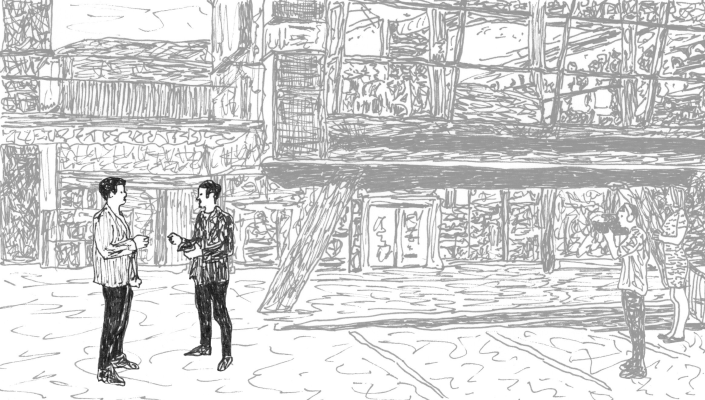 |
(Italiano) Helmut si sente cambiato dentro e vuole capire perché. Si defila con Heinz dalla festa che si sta facendo dopo il grande debutto degli episodi dei Ragazzi e gli racconta i sintomi che ha iniziato a sentire da poco. |
(Deutsch) Helmut fühlt sich innerlich verändert und will dem auf den Grund gehen. Er schleicht sich mit Heinz von der Party weg, die nach der grandiosen Debut-Premiere der Jungs-Episoden gefeiert wird, und schildert ihm die Symptome, die er seit Kurzem wahrnimmt. Normal Version | ||
Tag 26 1 Helmut: Du, Heinz, ich hab so ein komisches Gefühl. Wenn ich ... |
Day 26 Helmut: Listen, Heinz, I have this strange feeling. When I... |
Jour 26 Helmut : Écoute, Heinz, j'ai un sentiment bizarre. Quand je... |
Giorno 26 Helmut: Senti, Heinz, ho una strana sensazione. Quando io... |
Día 26 Helmut: Escucha, Heinz, tengo una sensación extraña. Cuando yo... |
2 Heinz: Den Produzenten gefällt auch das Fünf-Minuten-Format sehr gut. Dan hat es mit der Länge eines Songs verglichen. Ah, Hubert, was hast du da für uns? Ha ha, Autogrammkarten mit demselben Motiv. Danke, wow. |
Heinz: The producers also really like the five-minute format. Dan compared it to the length of a song. Ah, Hubert, what do you have for us? Ha ha, autograph cards with the same motif. Thanks, wow. |
Heinz : Les producteurs aiment aussi beaucoup le format de cinq minutes. Dan l'a comparé à la durée d'une chanson. Ah, Hubert, qu'est-ce que tu as là pour nous ? Ha ha, des cartes d'autographe avec le même motif. Merci, wow. |
Heinz: Ai produttori piace molto anche il formato di cinque minuti. Dan l'ha paragonato alla durata di una canzone. Ah, Hubert, cosa hai lì per noi? Ah ah, cartoline autografate con lo stesso motivo. Grazie, wow. |
Heinz: A los productores también les gusta mucho el formato de cinco minutos. Dan lo comparó con la duración de una canción. Ah, Hubert, ¿qué tienes ahí para nosotros? Ja, ja, tarjetas de autógrafos con el mismo motivo. Gracias, guau. |
3 Helmut: Nein, hör zu. Ich hab so ein komisches Gefühl, als würde ich immer gefilmt. |
Helmut: No, listen. I have this strange feeling that I'm always being filmed. |
Helmut : Non, écoute. J'ai cette drôle d'impression d'être toujours filmé. |
Helmut: No, ascolta. Ho questa strana sensazione di essere sempre ripreso. |
Helmut: No, escucha. Tengo la extraña sensación de que siempre me están filmando. |
4 Heinz: Soweit ich weiß, geht es schlicht darum, entsprechend der Situation zu handeln, ohne Abstraktion. |
Heinz: As far as I know, it's simply about acting according to the situation, without abstraction. |
Heinz : D'après ce que je sais, il s'agit simplement d'agir en fonction de la situation, sans abstraction. |
Heinz: Per quanto ne so, si tratta semplicemente di agire in base alla situazione, senza astrazioni. |
Heinz: Por lo que yo sé, se trata simplemente de actuar según la situación, sin abstracciones. |
(English) The second week of reality filming is coming to an end when the Boys are called to Sam Slam's office on Thursday evening. Heinz has a bad feeling, so Helmut reassures him, because after all, they have done an excellent job. |
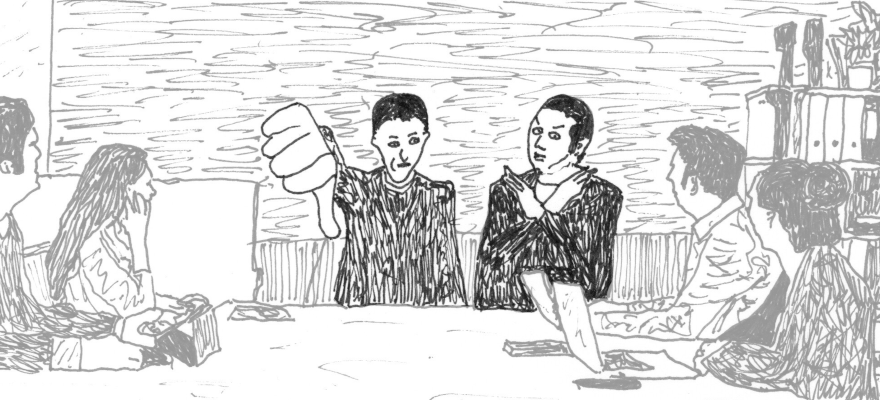 |
(Italiano) La seconda settimana delle riprese del reality sta per finire quando, giovedì sera, Sam Slam chiama i Ragazzi nel suo ufficio. Heinz ha una brutta sensazione, ma Helmut lo tranquillizza, perché dopotutto hanno fatto un ottimo lavoro. |
(Deutsch) Die zweite Woche der Reality-Dreharbeiten neigt sich dem Ende zu, als die Jungs am Donnerstagabend von Sam Slam in sein Büro gerufen werden. Heinz hat ein ungutes Gefühl, sodass Helmut ihm gut zuredet, denn immerhin haben sie hervorragende Arbeit geleistet. Normal Version | ||
Tag 29 1 Helmut: Wir haben es gleich zu den Sam Slam Studios geschafft, ohne dass die Polizei uns wegen des kaputten Scheinwerfers angehalten hat. Super Karma! |
Day 29 Helmut: In a minute, we will have made it to Sam Slam Studios without the police stopping us because of the broken headlight. Great karma! |
Jour 29 Helmut : Dans une minute, on sera arrivé aux studios Sam Slam sans que la police ne nous arrête à cause du phare cassé. Super karma ! |
Giorno 29 Helmut: Tra un minuto saremo arrivati ai Sam Slam Studios senza che la polizia ci abbia fermato per il faro rotto. Che karma! |
Día 29 Helmut: En un minuto habremos llegado a Sam Slam Studios sin que la policía nos haya parado por el faro roto. ¡Qué karma! |
2 Heinz: Du sprühst wirklich vor Ideen. Als du heute in der Innenstadt versucht hast, Umarmungen zu verkaufen! Ha ha. „Nein nein, Ma'am, das kostet einen Dollar!” Ha ha! |
Heinz: You really are bursting with ideas. Like when you tried to sell hugs downtown today! Ha ha. "No, no, ma'am, that'll be one dollar!" Ha ha! |
Heinz : Tu débordes vraiment d'idées. Comme quand tu as essayé de vendre des câlins en centre-ville aujourd'hui ! Ha ha. « Non, non, ma'am, ça fera un dollar ! » Ha ha ! |
Heinz: Sei davvero pieno di idee. Come quando oggi hai cercato di vendere abbracci in centro! Ah ah. "No, no, ma'am, costa un dollaro!" Ah ah! |
Heinz: Realmente rebosas ideas. ¡Como cuando hoy has intentado vender abrazos en el centro de la ciudad! Ja, ja. "No, no, ma'am, ¡cuesta un dólar!". ¡Ja, ja! |
3 Heinz: Eigentlich sollten es nur Streiche sein. Aber sie sind nach hinten losgegangen. Als du gedacht hast, dass der Farbeimer oben auf der Tür klemmt und ... |
Heinz: Originally, they were only supposed to be pranks. But they backfired. When you thought the paint bucket was stuck on top of the door and... |
Heinz : À l'origine, ce n'étaient que des farces. Mais elles se sont retournées contre nous. Quand tu as cru que le seau de peinture était coincé au-dessus de la porte et... |
Heinz: In origine dovevano essere solo scherzi. Ma si sono ritorte contro. Quando pensavi che il secchio di vernice fosse incastrato sopra la porta e... |
Heinz: Al principio solo iban a ser bromas. Pero se volvieron en contra. Cuando pensabas que el cubo de pintura estaba atascado encima de la puerta y... |
4 Heinz: Und, was gibt's Neues? |
Heinz: So, what's new? |
Heinz : Alors, quoi de neuf ? |
Heinz: Allora, che novità ci sono? |
Heinz: ¿Qué hay de nuevo? |
(English) When one door closes, a window opens. Or was it a trapdoor? In any case, something opens up for Helmut after he makes his grave decision, and Heinz can't stop marveling at the whole thing. Rachel, Paco, and Hubert feel the same way. |
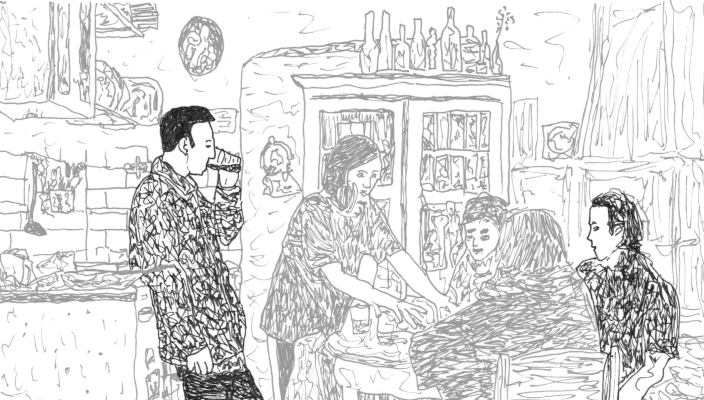 |
(Italiano) Quando una porta si chiude, si apre una finestra. O forse era una botola? Comunque, dopo che Helmut ha preso la sua decisione grave, qualcosa si apre per lui, e Heinz non riesce a smettere di stupirsi. Lo stesso vale per Rachel, Paco e Hubert. |
(Deutsch) Wenn sich eine Tür schließt, öffnet sich ein Fenster. Oder war es eine Falltür? Irgendwas öffnet sich jedenfalls bei Helmut, nachdem er seine schwerwiegende Entscheidung getroffen hat, und Heinz kommt aus dem Staunen nicht heraus. Rachel, Paco und Hubert dito. Normal Version | ||
Tag 29 1 Helmut: Ich hab eine gute und eine schlechte Nachricht. |
Day 29 Helmut: I have good news and bad news. |
Jour 29 Helmut : J'ai une bonne et une mauvaise nouvelle. |
Giorno 29 Helmut: Ho una notizia buona e una cattiva. |
Día 29 Helmut: Tengo una buena y una mala noticia. |
2 Heinz: Lasst uns in die Küche gehen, ich setz Teewasser auf. Oh, danke, Rachel, sag das Helmut. |
Heinz: Let's go to the kitchen, I'll put the kettle on. Oh, thanks, Rachel, tell Helmut. |
Heinz : Allons dans la cuisine, je vais mettre l'eau pour le thé. Oh, merci, Rachel, dis-le à Helmut. |
Heinz: Andiamo in cucina, metto su l'acqua per il tè. Oh, grazie, Rachel, dillo a Helmut. |
Heinz: Vamos a la cocina, voy a poner agua para el té. Oh, gracias, Rachel, díselo a Helmut. |
3 Heinz: Nehmt ihr alle schwarzen Tee? Ich mach ein bisschen Salbei rein, wenn ihr nichts dagegen habt. |
Heinz: Do you all drink black tea? I'll add a little sage if you don't mind. |
Heinz : Vous prenez tous du thé noir ? Je vais ajouter un peu de sauge si ça ne vous dérange pas. |
Heinz: Bevete tutti tè nero? Aggiungerò un po' di salvia, se per voi va bene. |
Heinz: ¿Todos tomáis té negro? Añadiré un poco de salvia, si no os importa. |
4 Helmut: Ja. Der Ring. 'Aweeshkone xaa, 'ekwaa'a xaa! |
Helmut: Yes. The ring. 'Aweeshkone xaa, 'ekwaa'a xaa! |
Helmut : Oui. La bague. 'Aweeshkone xaa, 'ekwaa'a xaa! |
Helmut: Sì. L'anello. 'Aweeshkone xaa, 'ekwaa'a xaa! |
Helmut: Sí. El anillo. 'Aweeshkone xaa, 'ekwaa'a xaa! |
(English) The Boys have plenty of time now to recover from the days of filming. Helmut suggests a trip to the beach in Santa Monica in their Peugeot, but on the way someone gets in their way who literally takes Helmut's senses away. |
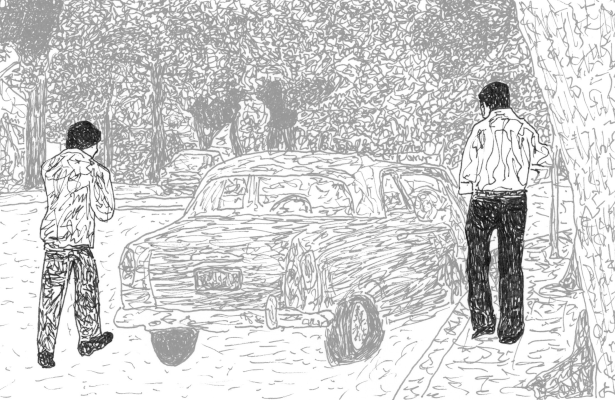 |
(Italiano) I Ragazzi hanno un sacco di tempo adesso per riposarsi dopo le giornate di riprese. Helmut propone di fare un giro con la loro Peugeot fino alla spiaggia di Santa Monica, ma lungo la strada incontrano qualcuno che fa letteralmente perdere i sensi a Helmut. |
(Deutsch) Die Jungs haben jetzt viel Zeit, um sich von den Drehtagen zu erholen. Helmut schlägt einen Ausflug mit ihrem Peugeot nach Santa Monica an den Strand vor, aber unterwegs kommt ihnen jemand dazwischen, der Helmut buchstäblich die Sinne nimmt. Normal Version | ||
Autonom Tag 30 1 Helmut: Schon wieder nichts. Ich kann weder Dan noch Jeff telefonisch erreichen und sie antworten nicht auf meine E-Mails. |
Autonomous Day 30 Helmut: Again nothing. I can't reach Dan or Jeff by phone, and they're not responding to my emails. |
Autonome Jour 30 Helmut : Toujours rien. Je n'arrive pas à joindre ni Dan ni Jeff par téléphone, et ils ne répondent pas à mes e-mails. |
Autonomo Giorno 30 Helmut: Ancora niente. Non riesco a contattare Dan o Jeff al telefono e non rispondono alle mie e-mail. |
Autónomo Día 30 Helmut: Otra vez nada. No consigo localizar ni a Dan ni a Jeff por teléfono y no responden a mis correos electrónicos. |
2 Helmut: Bevor wir nach Santa Monica fahren, will ich dich um was bitten. |
Helmut: Before we drive to Santa Monica, I want to ask you something. |
Helmut : Avant de partir pour Santa Monica, j'aimerais te demander quelque chose. |
Helmut: Prima di andare a Santa Monica, voglio chiederti una cosa. |
Helmut: Antes de ir a Santa Mónica, quiero preguntarte algo. |
3 Heinz: (
) Da ist so ein leichtes Hämmern. Ich glaub, das kommt vom Motor. |
Heinz: (...) There's a slight hammering noise. I think it's coming from the engine. |
Heinz : (...) Il y a un léger bruit de martèlement. Je pense qu'il vient du moteur. |
Heinz: (...) Si sente un leggero rumore di martellamento. Credo che provenga dal motore. |
Heinz: (...) Se oye un ligero martilleo. Creo que viene del motor. |
4 Helmut: Aha. Und wo ist dieser Helmut? Was ist hier überhaupt los? |
Helmut: I see. And where is this Helmut? What's going on here anyway? |
Helmut : Je vois. Et où est cet Helmut ? Qu'est-ce qui se passe ici, de toute façon ? |
Helmut: Ah. E dov'è questo Helmut? Che succede qui, comunque? |
Helmut: Ajá. ¿Y dónde está ese Helmut? ¿Qué está pasando aquí, de todos modos? |
(English) It is no longer Helmut sitting next to Heinz in the car, but Tamet, who suggests finishing the route to Santa Monica. He remembers the old days and is shocked by what he sees passing by outside the window. |
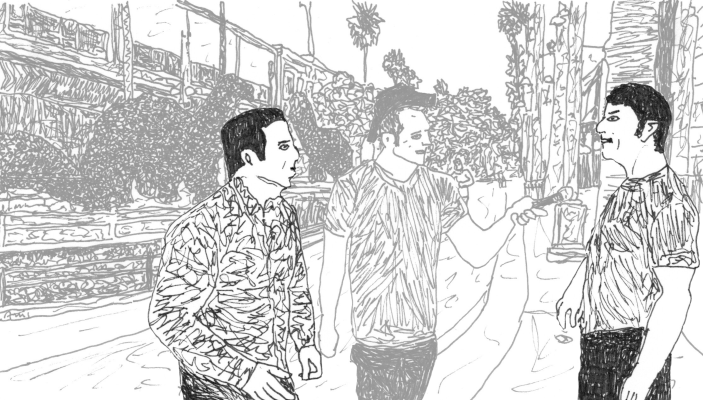 |
(Italiano) Accanto a Heinz in macchina non c'è più Helmut, ma Tamet, che propone di finire il viaggio fino a Santa Monica. Si ricorda dei vecchi tempi ed è scioccato da quello che vede fuori dal finestrino. |
(Deutsch) Neben Heinz sitzt jetzt nicht mehr Helmut im Auto, sondern Tamet, der vorschlägt, die Route nach Santa Monica zu Ende zu fahren. Er erinnert sich an alte Zeiten und ist schockiert über das, was er aus dem Fenster an sich vorüberziehen sieht. Normal Version | ||
Der Polyglott Tag 30 1 Helmut: Hast du da drinnen was gekauft? In dieser P-h-a-r-m-a-c-y? |
The Polyglot Day 30 Helmut: Did you buy something in there? In that p-h-a-r-m-a-c-y? |
Le Polyglotte Jour 30 Helmut : T'as acheté un truc là-dedans ? Dans cette p-h-a-r-m-a-c-y ? |
Il Poliglotta Giorno 30 Helmut: Hai preso qualcosa lì dentro? In quella p-h-a-r-m-a-c-y? |
El Políglota Día 30 Helmut: ¿Has comprado algo ahí dentro? ¿En esa p-h-a-r-m-a-c-y? |
2 Helmut: Soll ich fahren? |
Helmut: Shall I drive? |
Helmut : Je conduis ? |
Helmut: Guido io? |
Helmut: ¿Conduzco yo? |
3 Heinz: Und 1848, die neuen Siedler? |
Heinz: And in 1848, the new settlers? |
Heinz : Et en 1848, les nouveaux colons ? |
Heinz: E nel 1848, i nuovi coloni? |
Heinz: ¿Y en 1848, los nuevos colonos? |
4 Heinz: Und wie ging's dann weiter? Hast du dein Land wiedergekriegt? |
Heinz: And what happened next? Did you get your land back? |
Heinz : Et qu'est-ce qui s'est passé ensuite ? T'as récupéré tes terres ? |
Heinz: E poi cosa è successo? Hai riavuto la tua terra? |
Heinz: ¿Y qué pasó después? ¿Recuperaste tus tierras? |
(English) Sebastian can't believe that he has met a native speaker of Tongva. He immediately invites the two of them to his home, where he and Heinz learn more about the time in which Tamet lived. They then read on the internet that there are still survivors. |
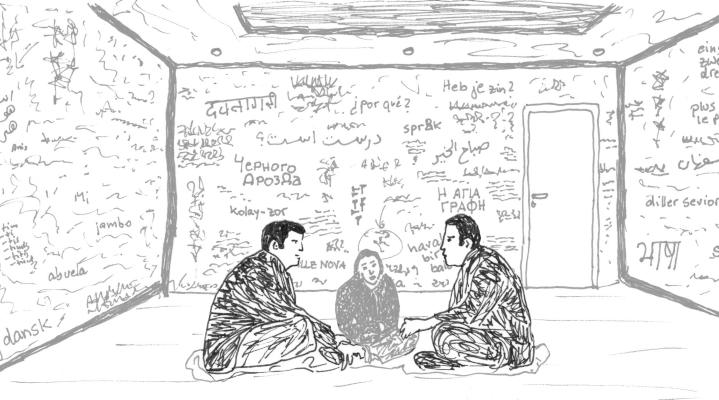 |
(Italiano) Sebastian non riesce a credere di aver incontrato qualcuno di madrelingua tongva. Subito invita entrambi a casa sua, dove lui e Heinz scoprono di più sul periodo in cui Tamet ha vissuto. Poi su Internet leggono che ci sono ancora dei sopravvissuti. |
(Deutsch) Sebastian kann nicht fassen, dass er einem Tongva-Muttersprachler begegnet. Sofort lädt er die beiden zu sich nach Hause ein, wo er und Heinz mehr über die Zeit erfahren, in der Tamet gelebt hat. Im Internet lesen sie dann, dass es noch Überlebende gibt. Normal Version | ||
Tag 30 1 Helmut: Aha, so sieht also eine typische Wohnung in „Santa Monica” aus. Interessante Wandbemalung. |
Day 30 Helmut: So this is what a typical apartment in "Santa Monica" looks like. Interesting wall paintings. |
Jour 30 Helmut : Ah, c'est donc à ça qu'un appart typique à « Santa Monica » ressemble. La peinture murale est cool. |
Giorno 30 Helmut: Ah, quindi è così che è un appartamento tipico a "Santa Monica". Che pittura murale interessante. |
Día 30 Helmut: Ah, así que así es un piso típico en "Santa Mónica". Interesante pintura mural. |
2 Helmut: Ach so, das ist, weil du ein Ex-Zen-Triker bist, stimmt's? Und jetzt bist du was? Händler? Lehrer? Oder was? Äh, was bedeutet das? |
Helmut: Oh, it's because you're an ex-zen-tric, right? And now you're what? A trader? A teacher? Or what? Uh, what does that mean? |
Helmut : Oh, c'est parce que tu es un ex-zen-trique, c'est ça ? Et maintenant, tu es quoi ? Commerçant ? Professeur ? Ou quoi ? Euh, ça veut dire quoi ? |
Helmut: Oh, è perché sei un ex-zen-trico, giusto? E adesso cosa sei? Commerciante? Insegnante? O cosa? Ehm, cosa significa? |
Helmut: Oh, es porque eres un ex-zen-trico, ¿verdad? ¿Y ahora qué eres? ¿Comerciante? ¿Profesor? ¿O qué? Eh, ¿qué significa eso? |
3 Helmut: Sie haben über Jahrzehnte Fakten geschaffen und uns hingehalten, bis es zu spät war. Sie wollten alles für sich haben. Und jetzt sind wir verschwunden. |
Helmut: They created facts over decades and stalled us until it was too late. They wanted everything for themselves. And now we've disappeared. |
Helmut : Ils ont créé des faits accomplis pendant des décennies et nous ont fait attendre jusqu'à ce qu'il soit trop tard. Ils voulaient tout pour eux. Et maintenant, on a disparu. |
Helmut: Hanno creato fatti compiuti per decenni e ci hanno fatto aspettare finché non era troppo tardi. Volevano tutto per sé. E ora siamo scomparsi. |
Helmut: Durante décadas crearon hechos consumados y nos dieron largas hasta que fue demasiado tarde. Lo querían todo para ellos. Y ahora hemos desaparecido. |
4 Heinz: Sag mal, 1852 war doch auch das Jahr, als deine Frau und du euch von eurer Gönnerin gelöst habt. Hatte das was mit den gebrochenen Versprechungen zu tun? Mit den nie ratifizierten Verträgen? |
Heinz: Say, 1852 was also the year when you and your wife broke away from your patron. Did that have anything to do with the broken promises? With the treaties that were never ratified? |
Heinz : Dis-moi, 1852 est aussi l'année où ta femme et toi vous êtes séparés de votre bienfaitrice. Est-ce que ça avait un rapport avec les promesses non tenues ? Avec les contrats jamais ratifiés ? |
Heinz: Dimmi, il 1852 è stato anche l'anno in cui tu e tua moglie vi siete separati dal vostro benefattrice. Ha avuto qualcosa a che fare con le promesse non mantenute? Con i contratti mai ratificati? |
Heinz: Oye, 1852 fue también el año en que tu mujer y tú os separasteis de vuestra benefactora. ¿Tuvo eso algo que ver con las promesas incumplidas? ¿Con los contratos nunca ratificados? |
(English) Back in Burbank, the Boys receive their friends from the shoot at home. Tamet takes the opportunity to give a breathtaking speech about what happened to the Tongva people. Rachel, Paco, and Hubert see the missing part and film everything. |
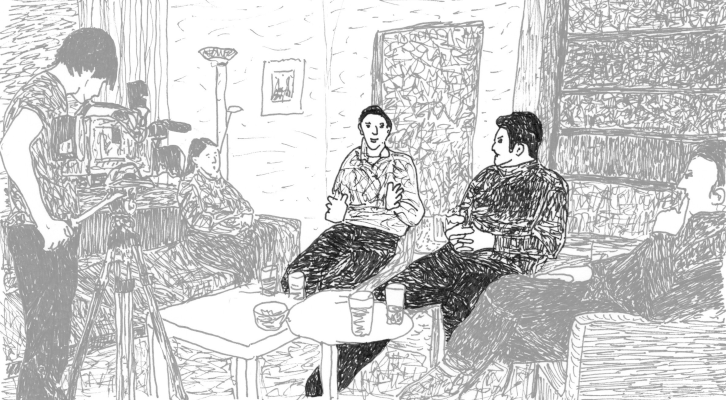 |
(Italiano) Di ritorno a Burbank, i Ragazzi danno il benvenuto ai loro amici dal set. Tamet ne approfitta per fare un discorso incredibile su quello che è successo al popolo Tongva. Rachel, Paco e Hubert notano la parte mancante e filmano tutto. |
(Deutsch) Zurück in Burbank empfangen die Jungs ihre Freunde vom Dreh. Tamet nutzt die Gelegenheit für eine atemberaubende Rede über das, was mit den Tongva passiert ist. Rachel, Paco und Hubert sehen den fehlenden Part und filmen alles. Normal Version | ||
Tag 31 1 Helmut: Und deshalb müssen wir über die Entstehung und die Geschichte von Los Angeles, von Kalifornien und von den USA insgesamt sprechen! So, ich bin fertig mit meinem Vortrag. Was ist? Ist was? |
Day 31 Helmut: And that's why we need to talk about the origins and history of Los Angeles, of California, and of the United States as a whole! All right, I'm done with my talk. What's up? Is something up? |
Jour 31 Helmut : Et c'est pour ça qu'on doit parler des origines et de l'histoire de Los Angeles, de la Californie et des États-Unis en général ! Voilà, j'ai fini mon discours. Qu'est-ce qu'il y a ? Il se passe quelque chose ? |
Giorno 31 Helmut: Ed è per questo che dobbiamo parlare delle origini e della storia di Los Angeles, della California e degli Stati Uniti in generale! Bene, ho finito il mio discorso. Che succede? C'è qualcosa che non va? |
Día 31 Helmut: ¡Y por eso tenemos que hablar sobre los orígenes y la historia de Los Ángeles, de California y de los Estados Unidos en general! Bueno, he terminado mi discurso. ¿Qué pasa? ¿Ocurre algo? |
2 Helmut: Schlepp schlepp, hier sind die Koffer. Ich nehm mir noch eine Banane, bevor wir losfahren. Mnjam |
Helmut: Drag drag, here are the suitcases. I'll just grab a banana before we leave. Mnyum |
Helmut : Traîne traîne. Voilà les valises. Je vais juste prendre une banane avant de partir. Mniam |
Helmut: Trasc trasc, ecco le valigie. Prendo solo una banana prima di partire. Mniam |
Helmut: Arr arr. Aquí están las maletas. Solo voy a coger un plátano antes de irnos. Mñam |
3 Helmut: Und wie soll es dann weitergehen? |
Helmut: And then what? |
Helmut : Et ensuite, comment ça se passe ? |
Helmut: E poi? |
Helmut: ¿Y luego qué? |
4 Heinz: Sie haben ihre wahnhafte göttliche Verbindung „Manifest Destiny” genannt. Ich erinner mich daran, dass selbst Obama den Begriff unkritisch gebraucht hat. |
Heinz: They called their delusional divine connection "Manifest Destiny". I remember that even Obama used the term uncritically. |
Heinz : Ils ont appelé leur connexion divine délirante « Manifest Destiny ». Je me souviens que même Obama a utilisé ce terme sans le remettre en question. |
Heinz: Hanno chiamato la loro delirante connessione divina "Manifest Destiny". Ricordo che anche Obama ha usato questo termine senza criticarlo. |
Heinz: Llamaban a su delirante conexión divina "destino manifiesto". Recuerdo que incluso Obama utilizó el término sin crítica alguna. |
(English) Helmut and Tamet have reached an agreement and are now working together in a symbiotic form of cooperation. Today, they are filming a new episode of the series "Helmut presents: Tamet's Tongva World" on the beach. |
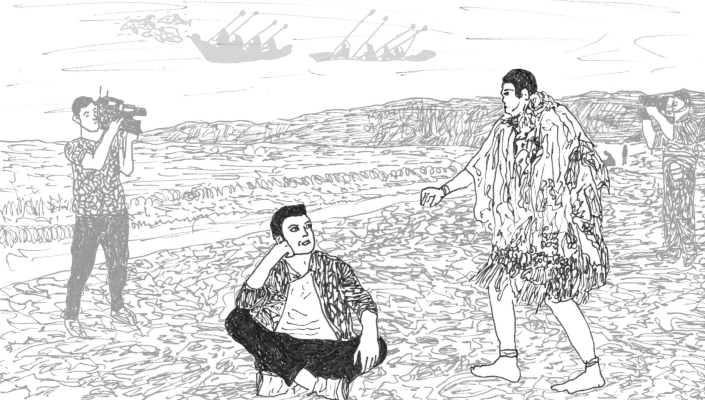 |
(Italiano) Helmut e Tamet hanno trovato un accordo e ora si aiutano a vicenda in una sorta di collaborazione simbiotica. Oggi stanno girando sulla spiaggia un nuovo episodio della serie "Helmut presenta: Il Mondo Tongva di Tamet". |
(Deutsch) Helmut und Tamet haben eine Vereinbarung getroffen und stehen sich nun gegenseitig in einer symbiotischen Form von Kooperation zur Verfügung. Heute drehen sie am Strand eine neue Folge aus der Sendereihe „Helmut präsentiert: Tamets Tongva-Welt”. Normal Version | ||
Tag 36 1 Helmut: Sind sie das da hinten? Nee, sah nur so aus. |
Day 36 Helmut: Is that them over there? No, it just looked like them. |
Jour 36 Helmut : C'est eux là-bas ? Non, c'était juste une impression. |
Giorno 36 Helmut: Sono loro quelli laggiù? No, sembravano solo loro. |
Día 36 Helmut: ¿Son ellos los que están allí? No, solo se parecían a ellos. |
2 Heinz: Die Sandalen und den Schmuck. Ah, da hinten winkt Sebastian uns zu. Eins zwei drei vier fünf ... Ja, alle da. Mit insgesamt drei Kameras. |
Heinz: The sandals and the jewelry. Ah, Sebastian is waving at us back there. One, two, three, four, five... Yes, everyone's there. With a total of three cameras. |
Heinz : Les sandales et les bijoux. Ah, Sebastian nous fait signe là-bas. Un, deux, trois, quatre, cinq... Oui, tout le monde est là. Avec trois caméras au total. |
Heinz: I sandali e i gioielli. Ah, Sebastian ci sta salutando da lì dietro. Uno, due, tre, quattro, cinque... Sì, ci sono tutti. Con un totale di tre telecamere. |
Heinz: Las sandalias y las joyas. Ah, Sebastián nos está saludando desde allí atrás. Uno, dos, tres, cuatro, cinco... Sí, están todos. Con un total de tres cámaras. |
3 Helmut: Heute ist die Muschelkette fertiggeworden, seht ihr? Wo wollt ihr die Kameras hinstellen? OK, und Makeup? Nur ein bisschen, damit mein Gesicht nicht so glänzt. Ja, so. |
Helmut: The shell necklace was completed today, see? Where do you want to put the cameras? OK, and makeup? Just a little, so my face doesn't shine so much. Yes, like that. |
Helmut : Le collier de coquillages est fini aujourd'hui, vous voyez ? Où voulez-vous mettre les caméras ? OK, et le maquillage ? Juste un peu, pour que mon visage ne brille pas trop. Oui, comme ça. |
Helmut: Oggi ho finito la collana di conchiglie, vedete? Dove volete mettere le telecamere? Ok, e il trucco? Solo un po', così il mio viso non brilla troppo. Sì, così. |
Helmut: Hoy he terminado el collar de conchas, ¿veis? ¿Dónde queréis colocar las cámaras? Vale, ¿y el maquillaje? Solo un poco, para que mi cara no brille tanto. Sí, así. |
4 Helmut: Plötzlich erschienen drei Delfine neben dem Kanu der Chumash und begleiteten sie. Das gab ihnen so viel Kraft, dass sie schließlich als erste die Insel erreichten. |
Helmut: Suddenly, three dolphins appeared next to the Chumash canoe and accompanied them. This gave them so much strength that they reached the island first. |
Helmut : Soudain, trois dauphins sont apparus à côté du canoë des Chumash et les ont accompagnés. Cela leur a donné tellement de force qu'ils ont fini par atteindre l'île en premier. |
Helmut: All'improvviso, tre delfini apparvero accanto alla canoa dei Chumash e li accompagnarono. Questo diede loro così tanta forza che furono i primi a raggiungere l'isola. |
Helmut: De repente, tres delfines aparecieron junto a la canoa chumash y los acompañaron. Esto les dio tanta fuerza que fueron los primeros en llegar a la isla. |
(English) Heinz finally gets one step closer to solving the mystery of the destroyed motorhome. The screenwriter's ex-partner mentions a few important points. Meanwhile, Helmut is playing with a child. What happens next can be summed up briefly as... Los Angeles, 2025. |
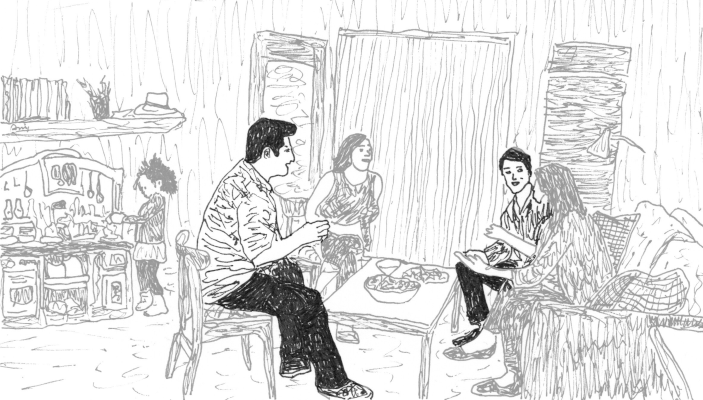 |
(Italiano) Alla fine Heinz si avvicina un po' di più al mistero del camper distrutto. L'ex della sceneggiatrice dice un paio di cose importanti. Nel frattempo, Helmut gioca con un bambino. Quello che succede dopo, è, in breve... Los Angeles 2025. |
(Deutsch) Endlich kommt Heinz dem Geheimnis des zerstörten Wohnmobils einen Schritt näher. Die Ex des Drehbuchschreibers nennt ein paar wichtige Punkte. Helmut spielt derweil mit einem Kind. Was dann geschieht, ist kurz gesagt Los Angeles 2025. Normal Version | ||
Tag 36 1 Heinz: Demnach war Jordan immer pleite, bis er diesen Drehbuchauftrag für den Armageddon-Film gekriegt hat. Ach so, das war schon 2022? Das wusste ich nicht. |
Day 36 Heinz: So Jordan was always broke until he got that screenplay commission for the Armageddon movie. Oh, that was back in 2022 already? I didn't know that. |
Jour 36 Heinz : Donc Jordan était toujours fauché jusqu'à ce qu'il décroche ce contrat pour écrire le scénario du film Armageddon. Ah bon, c'était déjà en 2022 ? Je ne savais pas. |
Giorno 36 Heinz: Quindi Jordan era sempre al verde finché non ha ricevuto quella commissione per la sceneggiatura del film Armageddon. Oh, era già nel 2022? Non lo sapevo. |
Día 36 Heinz: Así que Jordan siempre estuvo sin blanca hasta que le encargaron el guion de la película Armageddon. Oh, ¿ya era en 2022? No lo sabía. |
2 Heinz: Ja, sie kennt auch Rachel und Sam, hat sie vorhin erzählt. Ah, ist das mein Erdbeer-Taco? Ich hoffe, der ist mit Chili. Nicht? Oh, tja dann ... Rumpel krach brech schepper klick klick |
Heinz: Yes, she also knows Rachel and Sam, she mentioned earlier. Ah, is that my strawberry taco? I hope it has chili in it. No? Oh, well, then... Rumble crash crack clatter click click |
Heinz : Oui, elle connaît aussi Rachel et Sam, elle en a parlé tout à l'heure. Ah, c'est mon taco à la fraise ? J'espère qu'il est au chili. Non ? Oh, eh bien... Boum crash romp clac clique |
Heinz: Sì, conosce anche Rachel e Sam, ne ha parlato prima. Ah, quello è il mio taco alla fragola? Spero ci sia del peperoncino. No? Oh, beh, allora... Fracass bacc romp batt clic clic |
Heinz: Sí, también conoce a Rachel y Sam, lo mencionó antes. Ah, ¿ese es mi taco de fresa? Espero que lleve chile. ¿No? Oh, bueno, entonces... Traquet ruid cruj romp clic clic |
3 Helmut: Kuck dir die Wohnungstür an! Die haben die einfach eingetreten. Wieso haben sie nicht geklingelt? Jetzt kann man die nicht mehr abschließen. |
Helmut: Look at the apartment door! They just kicked it in. Why didn't they ring the bell? Now we can't lock it anymore. |
Helmut : Regarde la porte de l'appartement ! Ils l'ont simplement enfoncée. Pourquoi n'ont-ils pas sonné ? Maintenant, on ne peut plus la fermer à clé. |
Helmut: Guarda la porta dell'appartamento! L'hanno semplicemente sfondata. Perché non hanno suonato il campanello? Ora non si può più chiudere a chiave. |
Helmut: ¡Mira la puerta del piso! Simplemente la han derribado. ¿Por qué no han llamado al timbre? Ahora ya no se puede cerrar con llave. |
4 Helmut: Diese Fragen beschäftigen dich in letzter Zeit, stimmt's? Du liest viel und siehst dir Dokus an. |
Helmut: These issues have been on your mind lately, haven't they? You read a lot and watch documentaries. |
Helmut : Ces questions te préoccupent beaucoup ces derniers temps, n'est-ce pas ? Tu lis pas mal et tu regardes des documentaires. |
Helmut: Queste questioni ti preoccupano un sacco ultimamente, vero? Leggi molto e guardi documentari. |
Helmut: Estas cuestiones te preocupan mucho últimamente, ¿verdad? Lees bastante y ves documentales. |
(English) While working with Sebastian on the booklet about the Tongva language, Tamet feels that he is reaching his limits after an intense week. He therefore says goodbye early today and leaves Heinz and Helmut to their thoughts. |
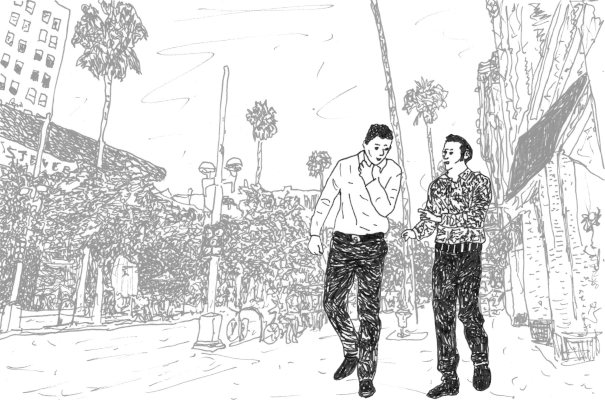 |
(Italiano) Mentre lavora con Sebastian al libricino sulla lingua Tongva, Tamet sente che, dopo una settimana intensa, sta raggiungendo i suoi limiti. Quindi oggi se ne va prima del previsto e lascia Heinz e Helmut ai loro pensieri. |
(Deutsch) Während er mit Sebastian am Büchlein über die Tongva-Sprache arbeitet, spürt Tamet, dass er nach einer intensiven Woche an seine Grenzen kommt. Er verabschiedet sich daher heute frühzeitig und überlässt Heinz und Helmut ihren Gedanken. Normal Version | ||
Tag 37 1 Helmut: OK, das war „groß/klein” und „früh/spät”. Sind das jetzt genug Gegensatzpaare? Was, noch fünfzig?? Oh oh oh. |
Day 37 Helmut: OK, that was "big/small" and "early/late". Is that enough opposite pairs now? What, fifty more?? Oh oh oh. |
Jour 37 Helmut : OK, on a fait « grand/petit » et « tôt/tard ». Ça suffit comme paires d'antonymes ? Quoi, encore cinquante ?? Oh oh oh. |
Giorno 37 Helmut: Ok, abbiamo fatto "grande/piccolo" e "presto/tardi". Basta così con le coppie di contrari? Cosa, altre cinquanta?? Oh oh oh. |
Día 37 Helmut: Vale, hemos hecho "grande/pequeño" y "temprano/tarde". ¿Ya está bien con los pares de antónimos? ¿¿Qué, otros cincuenta?? Oh, oh, oh. |
2 Heinz: Moment! Tamet ... |
Heinz: Wait! Tamet... |
Heinz : Attends ! Tamet... |
Heinz: Aspetta! Tamet... |
Heinz: ¡Espera! Tamet... |
3 Heinz: So was haben wir in Deutschland auch: die Bier/Wein-Grenze. Dann gibt es die Butter/Olivenöl-Grenze in Westeuropa und die Pfeffer/Paprika-Grenze in Osteuropa. |
Heinz: We have something like that in Germany too: the beer/wine limit. Then there's the butter/olive oil limit in Western Europe and the pepper/paprika limit in Eastern Europe. |
Heinz : On a quelque chose de similaire en Allemagne : la limite bière/vin. Il y a aussi la limite beurre/huile d'olive en Europe occidentale et la limite poivre/paprika en Europe orientale. |
Heinz: Abbiamo qualcosa di simile anche in Germania: il limite tra birra e vino. Poi c'è il limite tra burro e olio d'oliva nell'Europa occidentale e quello tra pepe e paprika nell'Europa orientale. |
Heinz: En Alemania también tenemos algo parecido: el límite de la cerveza/vino. Luego está el límite de la mantequilla/aceite de oliva en Europa occidental y el límite de la pimienta/pimentón en Europa oriental. |
4 Helmut: „Projektiver Antizionismus”, sehr wissenschaftlich. |
Helmut: "Projective Anti-Zionism", very scientific. |
Helmut : « Antisionisme projectif », très scientifique. |
Helmut: "Antisionismo proiettivo", molto scientifico. |
Helmut: "Antisionismo proyectivo", muy científico. |
(English) The next day, Heinz takes Tamet to Temescal Gateway Park, where they can see the ocean and the city from above. The Tongva spirit talks about his wife and their life together in the resistance. Then he makes a wish. |
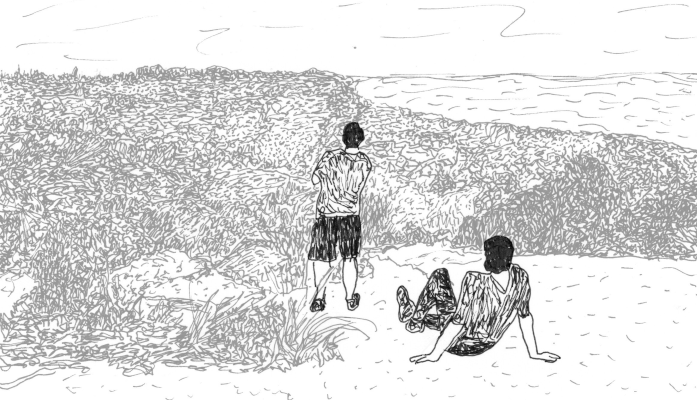 |
(Italiano) Il giorno dopo Heinz porta Tamet al Temescal Gateway Park, dove possono vedere il mare e la città dall'alto. Lo spirito Tongva racconta di sua moglie e della loro vita insieme nella resistenza. Poi esprime un desiderio. |
(Deutsch) Heinz führt Tamet am nächsten Tag in den Temescal Gateway Park, wo die beiden von oben aufs Meer und die Stadt sehen können. Der Tongva-Geist erzählt von seiner Frau und ihrem gemeinsamen Leben im Widerstand. Dann spricht er einen Wunsch aus. Normal Version | ||
Tag 38 1 Helmut: Temescal Gateway Park heißt das heute also, aha. Hier oben war es, dass Bríd und ich den Entschluss gefasst haben, uns von unserer Gönnerin Victoria Reid zu trennen. Wir wollten uns auf die Aufgabe konzentrieren, den Widerstand zu vereinigen. |
Day 38 Helmut: So it's called Temescal Gateway Park nowadays, is it? It was up here that Bríd and I decided to part ways with our patron Victoria Reid. We wanted to focus on the task of uniting the resistance. |
Jour 38 Helmut : Ça s'appelle donc aujourd'hui Temescal Gateway Park, je vois. C'est ici en haut que Bríd et moi avons décidé de nous séparer de notre protectrice Victoria Reid. On voulait se concentrer sur la tâche d'unir la résistance. |
Giorno 38 Helmut: Quindi oggi si chiama Temescal Gateway Park, capisco. È stato proprio quassù che io e Bríd abbiamo deciso di lasciare la nostra benefattrice Victoria Reid. Volevamo concentrarci sul compito di unire la resistenza. |
Día 38 Helmut: Así que ahora se llama Temescal Gateway Park, ya veo. Fue aquí arriba donde Bríd y yo decidimos separarnos de nuestra benefactora Victoria Reid. Queríamos centrarnos en la tarea de unir a la resistencia. |
2 Heinz: Und wogegen hat sie rebelliert? |
Heinz: And what was she rebelling against? |
Heinz : Et contre quoi se rebellait-elle ? |
Heinz: E contro cosa si ribellava? |
Heinz: ¿Y contra qué se rebelaba? |
3 Helmut: Zu meiner Zeit war der Sklavenaufstand von Nat Turner in Virginia 1831 noch in aller Munde. Er und seine Leute haben Dutzende Sklavenhalter und ihre Familien umgebracht, sogar Kinder. |
Helmut: In my day, everyone was still talking about Nat Turner's slave rebellion in Virginia in 1831. He and his people killed dozens of slave owners and their families, even children. |
Helmut : À mon époque, tout le monde parlait encore de la révolte des esclaves menée par Nat Turner en Virginie en 1831. Lui et ses hommes ont tué des dizaines de propriétaires d'esclaves et leurs familles, même des enfants. |
Helmut: Ai miei tempi, tutti parlavano ancora della ribellione degli schiavi di Nat Turner in Virginia nel 1831. Lui e la sua gente uccisero decine di proprietari di schiavi e le loro famiglie, persino i bambini. |
Helmut: En mi época, todo el mundo seguía hablando de la rebelión de esclavos de Nat Turner en Virginia en 1831. Él y su gente mataron a docenas de propietarios de esclavos y a sus familias, incluso a niños. |
4 Heinz: Tamet hat sich verabschiedet. Er möchte, dass wir seinen Geist würdig bestatten. |
Heinz: Tamet said goodbye. He wants us to bury his spirit with dignity. |
Heinz : Tamet a fait ses adieux. Il veut qu'on enterre son esprit avec dignité. |
Heinz: Tamet ci ha detto addio. Vuole che seppelliamo il suo spirito con dignità. |
Heinz: Tamet se ha despedido. Quiere que enterremos su espíritu con dignidad. |
(English) Together, the members of the film crew, including Sebastian, go through the best scenes from two short careers in order to compile half an hour of material for tomorrow's event. Helmut has a pretty clear idea of what he wants. |
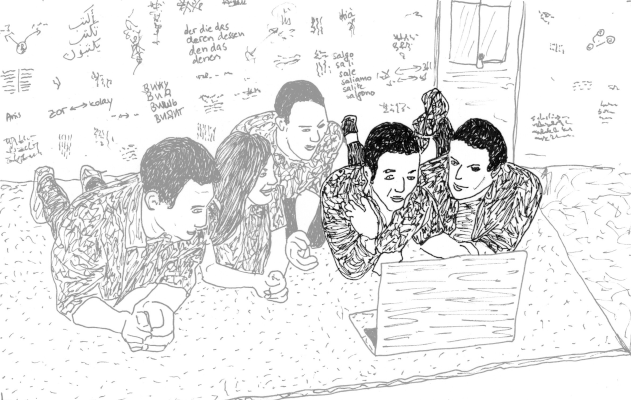 |
(Italiano) Insieme, i membri della troupe cinematografica, compreso Sebastian, guardano le scene migliori di due brevi carriere al fine di mettere insieme mezz'ora di materiale per l'evento di domani. Helmut ha le idee piuttosto chiare su quello che vuole. |
(Deutsch) Gemeinsam gehen die Mitglieder der Filmcrew inklusive Sebastian die besten Szenen aus zwei kurzen Karrieren durch, um eine halbe Stunde Material für die morgige Veranstaltung zusammenzustellen. Helmut hat recht genaue Vorstellungen von dem, was er will. Normal Version | ||
Money Shot Tag 39 1 Helmut: OK, haben wir uns jetzt auf eine Shortlist der potenziellen Money-Shots geeinigt? Wir brauchen diesen Wow-Effekt, um zur Benchmark zu werden und das Branding zu beschleunigen. |
Money Shot Day 39 Helmut: OK, have we agreed on a shortlist of potential money shots? We need that wow effect to become a benchmark and accelerate branding. |
Money Shot Jour 39 Helmut : Bon, on s'est mis d'accord sur une shortlist des potentiels money shots ? On a besoin de cet effet waouh pour devenir un benchmark et accélérer le branding. |
Money Shot Giorno 39 Helmut: Ok, ci siamo messi d'accordo su una shortlist dei potenziali money shot? Abbiamo bisogno di quell'effetto wow per diventare un benchmark e accelerare il branding. |
Money Shot Día 39 Helmut: Bien, ¿ya nos hemos puesto de acuerdo en una shortlist de posibles money shots? Necesitamos ese efecto wow para convertirnos en un benchmark y acelerar el branding. |
2 Heinz: Aua! Spinnst du? Wir drehen hier keine Slapstickfilme, sondern ... Äh, was? Getränke? Klar, Tee für mich. Danke. |
Heinz: Ouch! Are you crazy? We're not shooting slapstick movies here, but... Er, what? Drinks? Sure, tea for me. Thanks. |
Heinz : Aïe ! T'es fou ? On ne tourne pas de films burlesques ici, mais... Euh, quoi ? Des boissons ? Oui, du thé pour moi. Merci. |
Heinz: Ahi! Sei pazzo? Non stiamo girando un film comico qui, ma... Ehm, cosa? Da bere? Sì, tè per me. Grazie. |
Heinz: ¡Ay! ¿Estás loco? No estamos rodando películas de slapstick, pero... Eh, ¿qué? ¿Bebidas? Claro, té para mí. Gracias. |
3 Helmut: Ah, Sebastian, da bist du ja wieder. Kommst du dann morgen mit? Sehr gut. Und Owen? Hat keine Zeit, schade. |
Helmut: Ah, Sebastian, there you are again. So are you coming tomorrow? Very good. And Owen? Doesn't have time, too bad. |
Helmut : Ah, Sebastian, te revoilà. Alors, tu viens demain ? Très bien. Et Owen ? Il n'a pas le temps, dommage. |
Helmut: Ah, Sebastian, eccoti di nuovo. Allora, vieni domani? Ottimo. E Owen? Non ha tempo, peccato. |
Helmut: Ah, Sebastián, aquí estás otra vez. Entonces, ¿vas a venir mañana? Muy bien. ¿Y Owen? No tiene tiempo, qué pena. |
4 Heinz: Dafür zahlst du ja auch den ganzen Kram. |
Heinz: In exchange, you're paying for all this stuff. |
Heinz : En revanche, tu paies pour tout ça. |
Heinz: In cambio, tu paghi per tutto questo. |
Heinz: A cambio, tú pagas todo esto. |
(English) Helmut has prepared well for the open screening in Westlake and quickly wins over the audience with his short speech after the film presentation. Heinz, on the other hand, cannot control his nerves, which leads to a spectacular outburst. |
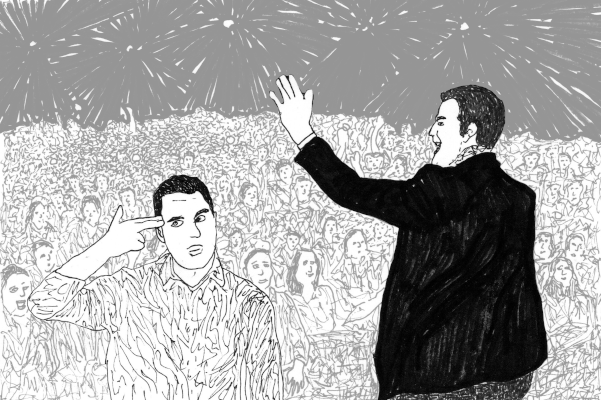 |
(Italiano) Helmut si è preparato bene per la proiezione aperta a Westlake e conquista subito il pubblico con il suo breve discorso dopo la presentazione del film. Heinz, invece, non riesce a controllare i nervi, il che porta a uno sfogo esplosivo. |
(Deutsch) Auf das Open Screening in Westlake hat sich Helmut gut vorbereitet und er gewinnt das Publikum bei seiner kleinen Rede nach der Filmpräsentation schnell für sich. Heinz hingegen kann seine Nerven nicht kontrollieren, was zu einer fulminanten Entladung führt. Normal Version | ||
Tag 40 1 Helmut: Vielen Dank für den Applaus! Danke! Heinz, schaltest du mal den Übersetzer ein, bitte? Und hör auf, mit dem Fuß zu wippen, das macht mich wahnsinnig. |
Day 40 Helmut: Thank you very much for the applause! Thank you! Heinz, could you turn on the translator, please? And stop tapping your foot, it's driving me crazy. |
Jour 40 Helmut : Merci beaucoup pour les applaudissements ! Merci ! Heinz, tu peux allumer le traducteur, s'il te plaît ? Et arrête de taper du pied, ça me rend dingue. |
Giorno 40 Helmut: Grazie mille per gli applausi! Grazie! Heinz, puoi accendere il traduttore, per favore? E smettila di muovere i piedi, mi fa impazzire. |
Día 40 Helmut: ¡Muchas gracias por los aplausos! ¡Gracias! Heinz, ¿puedes encender el traductor, por favor? Y deja de mover el pie, me está volviendo loco. |
2 Helmut: Es handelt sich um eine Melange aus unserem Portfolio. |
Helmut: It's a mélange from our portfolio. |
Helmut : Il s'agit d'un mélange de notre portfolio. |
Helmut: Si tratta di un mélange dal nostro portfolio. |
Helmut: Se trata de un mélange de nuestro portfolio. |
3 Helmut: Doch dann kamen unsere lieben Freunde Rachel, Paco und Hubert dazu. Steht bitte auf, ihr drei! Ja, einen Applaus bitte, ohne sie wären wir heute nicht hier. |
Helmut: But then our dear friends Rachel, Paco, and Hubert joined us. Please stand up, you three! Yes, a round of applause, please. Without them, we wouldn't be here today. |
Helmut : Mais ensuite, nos chers amis Rachel, Paco et Hubert nous ont rejoints. Levez-vous, vous trois ! Oui, applaudissez-les, s'il vous plaît. Sans eux, on ne serait pas là aujourd'hui. |
Helmut: Ma poi si sono uniti a noi i nostri cari amici Rachel, Paco e Hubert. Alzatevi, voi tre! Sì, un applauso, per favore. Senza di loro, oggi non saremmo qui. |
Helmut: Pero luego se unieron a nosotros nuestros queridos amigos Rachel, Paco y Hubert. ¡Levantaos, vosotros tres! Sí, aplaudidles, por favor. Sin ellos, no estaríamos aquí hoy. |
4 Helmut: Jetzt gib das ... |
Helmut: Now give me that... |
Helmut : Allez, donne-moi ça... |
Helmut: Ora dammi quello... |
Helmut: Ahora dame eso... |
(English) Helmut is not on good terms with his friend, who seems to cause nothing but trouble, yet on closer inspection, Heinz's comments are not entirely unfounded. But is Hubert really a spy involved in a conspiracy? Opinions vary widely. |
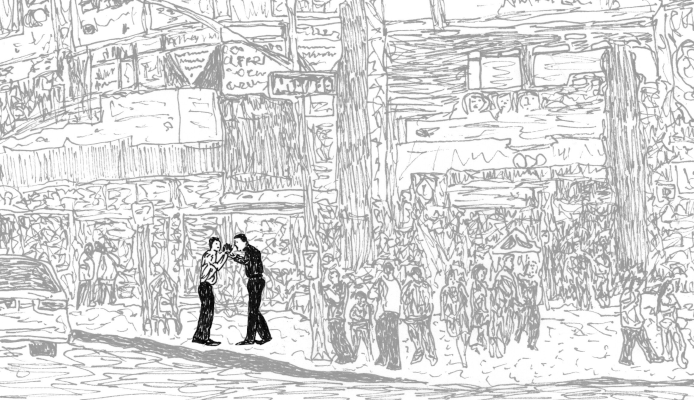 |
(Italiano) Helmut non è molto contento del suo amico, che sembra solo creare problemi, anche se, a ben vedere, i commenti di Heinz non sono del tutto infondati. Ma Hubert è davvero una spia coinvolta in una cospirazione? Le opinioni sono molto diverse. |
(Deutsch) Helmut ist nicht gut auf seinen Freund zu sprechen, der nur Ärger zu machen scheint, doch ganz unbegründet sind Heinz' Kommentare bei näherem Hinsehen nicht. Aber ob Hubert tatsächlich ein Spion in einer Verschwörung ist? Die Meinungen gehen weit auseinander. Normal Version | ||
Tag 40 1 Heinz: Ist dir aufgefallen, dass es bei Stan und Ollie Mystery-Elemente gibt? Also bei Stan. Einmal hat er seinen Daumen als Feuerzeug benutzt und einmal auf einem Bettgerüst Harfe gespielt. Zum Beispiel. |
Day 40 Heinz: Have you noticed that there are mystery elements in Stan and Ollie? In Stan, that is. Once he used his thumb as a lighter and once he played the harp on a bed frame. For example. |
Jour 40 Heinz : T'as remarqué qu'il y a des éléments de mystère chez Stan et Ollie ? Enfin, chez Stan. Une fois, il a utilisé son pouce comme briquet et une autre fois, il a joué de la harpe sur un cadre de lit. Par exemple. |
Giorno 40 Heinz: Hai mai notato che ci sono elementi di mistero in Stan e Ollie? Intendo dire in Stan. Una volta ha usato il pollice come accendino e un'altra volta ha suonato l'arpa sul telaio di un letto. Per esempio. |
Día 40 Heinz: ¿Te has dado cuenta de que hay elementos de misterio en Stan y Ollie? Bueno, en Stan. Una vez utilizó su pulgar como mechero y otra vez tocó el arpa en el armazón de una cama. Por ejemplo. |
2 Heinz: Sieht aus wie Hexenschuss. Er entfernt sich in gekrümmter Haltung. |
Heinz: Looks like he threw his back out. He walks away bent over. |
Heinz : On dirait un tour de reins. Il s'éloigne en se courbant. |
Heinz: Sembra un colpo della strega. Si allontana piegandosi in due. |
Heinz: Parece un tirón en la espalda. Se aleja encorvado. |
3 Heinz: Zufällig, klar. Und hat er dich zufällig auch über Holger ausgefragt? So ganz nebenbei? |
Heinz: Coincidentally, of course. And did he coincidentally ask you about Holger too? Just in passing? |
Heinz : Par hasard, bien sûr. Et est-ce qu'il t'a aussi interrogé sur Holger par hasard ? Comme ça, en passant ? |
Heinz: Per caso, certo. E per caso ti ha anche chiesto di Holger? Così, di sfuggita? |
Heinz: Casualmente, por supuesto. ¿Y casualmente también te preguntó por Holger? ¿Así, de pasada? |
4 Heinz: Zurück zum Thema: Das Chamäleon interessiert sich dafür, wie viel wir über die Verschwörung wissen. Du erinnerst dich doch, dass ich denen gesagt hab, dass wir ein Druckmittel haben. |
Heinz: Back to the topic: The Chameleon is interested in how much we know about the conspiracy. You remember that I told them we had leverage. |
Heinz : Revenons au sujet : le Caméléon veut savoir ce qu'on sait sur le complot. Tu te souviens que je leur ai dit qu'on avait un moyen de pression. |
Heinz: Torniamo all'argomento: il Camaleonte è interessato a sapere quanto sappiamo della cospirazione. Ti ricordi che gli ho detto che avevamo un mezzo di pressione. |
Heinz: Volviendo al tema: El Camaleón está interesado en saber cuánto sabemos sobre la conspiración. Recuerdas que les dije que teníamos un medio de presión. |
(English) Heinz has found the right place to lay Tamet to rest. The Boys meet Samantha on real Tongva land. Helmut seems to recognize the place and temporarily transforms into a double person. |
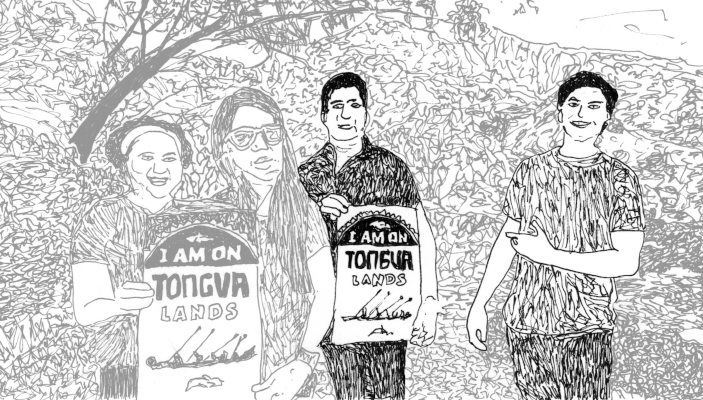 |
(Italiano) Heinz ha trovato il posto giusto per dare l'ultimo saluto a Tamet. I Ragazzi incontrano Samantha nella vera terra dei Tongva. Helmut sembra riconoscere il posto e per un attimo si trasforma in una persona doppia. |
(Deutsch) Heinz hat den richtigen Ort gefunden, um Tamet zur letzten Ruhe zu betten. Die Jungs treffen Samantha auf echtem Tongva-Land. Helmut scheint den Ort wiederzuerkennen und verwandelt sich vorübergehend in eine doppelte Person. Normal Version | ||
Tag 41 1 Heinz: Peng rat-rat-rat knatter rz-rz. Das Auto macht es nicht mehr lange. |
Day 41 Heinz: Bang rat-rat-rat rattle rz-rz. The car won't last much longer. |
Jour 41 Heinz : Pan ratt-ratt-ratt pétarade rts-rts. La voiture ne tiendra pas longtemps. |
Giorno 41 Heinz: Bang rat-rat-rat crepit rz-rz. L'auto non durerà ancora a lungo. |
Día 41 Heinz: Bang rat-rat-rat crepit rz-rz. El coche no va a durar mucho más. |
2 Helmut: Und was du Hubert gestern Abend im Auto erzählt hast, tsis! Sebastian hält dich jetzt auch für einen Psycho auf einem Agententrip. |
Helmut: And what you told Hubert in the car last night, tsis! Now Sebastian too thinks you're a psycho on a spy trip. |
Helmut : Et ce que tu as dit à Hubert dans la voiture hier soir, tsiss ! Maintenant, Sebastian pense lui aussi que tu es un psychopathe qui se prend pour un agent secret. |
Helmut: E quello che hai detto a Hubert in macchina ieri sera, tsis! Ora anche Sebastian pensa che tu sia uno psicopatico che si crede un agente segreto. |
Helmut: ¡Y lo que le dijiste a Hubert en el coche anoche, tsis! Ahora Sebastián también piensa que eres un psicópata que se cree un agente secreto. |
3 Helmut: Wir? Aus Mainz. Also, eigentlich aus Norddeutschland. Ja. Jobs in Hollywood, du kennst das ja. Erst in Burbank, dann ... |
Helmut: We? From Mainz. Well, originally from northern Germany. Yes. Jobs in Hollywood, you know how it is. First in Burbank, then... |
Helmut : Nous ? De Mayence. Enfin, d'origine du nord de l'Allemagne. Oui. Des boulots à Hollywood, tu sais comment c'est. D'abord à Burbank, puis... |
Helmut: Noi? Da Magonza. Beh, in realtà dal nord della Germania. Sì. Lavori a Hollywood, sai com'è. Prima a Burbank, poi... |
Helmut: ¿Nosotros? De Maguncia. Bueno, en realidad del norte de Alemania. Sí. Trabajos en Hollywood, ya sabes cómo es. Primero en Burbank, luego... |
4 Helmut: Da, hört ihr das? Tatzen oder Pfoten. Das kam aus dieser Richtung. |
Helmut: There, you hear that? Paws. It came from that direction. |
Helmut : Là, vous entendez ça ? Des pattes. Ça venait de cette direction. |
Helmut: Ecco, lo sentite? Zampe. Veniva da quella direzione. |
Helmut: ¿Lo oís? Patas o garras. Venía de esa dirección. |
(English) The pseudo-Columbo Peugeot struggles to make its way back to Santa Monica. At first it looks like it will, but at the end of the episode it still hasn't arrived, and the two drivers of the vehicle had imagined the rest of the day differently. Very differently. |
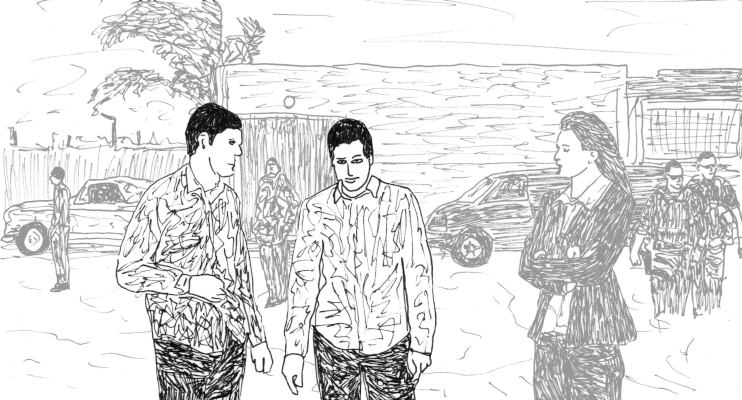 |
(Italiano) La pseudo-Columbo-Peugeot fa fatica a tornare a Santa Monica. All'inizio sembra che ce la faccia, ma alla fine dell'episodio non è ancora arrivata e i due guidatori del veicolo avevano immaginato il resto della giornata in modo diverso. Molto diverso. |
(Deutsch) Der Pseudo-Columbo-Peugeot hat Mühe, den Weg zurück nach Santa Monica zu schaffen. Erst sieht es danach aus, aber am Ende der Episode ist er noch nicht angekommen und die beiden Fahrer des Vehikels hatten sich den Rest des Tages anders vorgestellt. Ganz anders. Normal Version | ||
Tag 41 1 Helmut: Peng rat-rat-rat knatter rz-rz. Nur noch ein paar Kilometer, gutes Auto. Morgen kriegst du einen neuen Besitzer. Der will dich von Grund auf reparieren. Ein Freund. |
Day 41 Helmut: Bang rat-rat-rat rattle rz-rz. Just a few more miles, good car. Tomorrow you'll have a new owner. He wants to repair you from the ground up. A friend. |
Jour 41 Helmut : Pan ratt-ratt-ratt pétarade rts-rts. Plus que quelques kilomètres, ma vieille. Demain, tu auras un nouveau proprio. Il veut te réparer de fond en comble. Un ami. |
Giorno 41 Helmut: Bang rat-rat-rat fracass rz-rz. Ancora pochi chilometri, brava macchina. Domani avrai un nuovo proprietario. Vuole sistemarti da cima a fondo. Un amico. |
Día 41 Helmut: Bang rat-rat-rat crepit rz-rz. Solo quedan unos kilómetros, buen coche. Mañana tendrás un nuevo dueño. Quiere repararte de arriba abajo. Un amigo. |
2 Heinz: Warte mal, ich glaub, da ist was mit dem Auto. |
Heinz: Wait a minute, I think there's something wrong with the car. |
Heinz : Attends, je crois qu'il y a un problème avec la voiture. |
Heinz: Aspetta, credo che ci sia qualcosa che non va con la macchina. |
Heinz: Espera, creo que hay un problema con el coche. |
3 Helmut: Uns? Gut geht's uns. Jaaa. Wir haben ... Äh, wer? Oh, Aouda! Ja, klar. Unser Äffchen. Das ist wieder in der Heimat, in Indien. Stimmt, du hattest sie uns ja ... weggenommen, als wir mit dem Schiff in Kalifornien angekommen waren und ... eingesperrt wurden. Und du so, Faye? |
Helmut: We? We're fine. Yeah. We have... Uh, who? Oh, Aouda! Yes, of course. Our little monkey. She's back home in India. Right, you took her... away from us when we arrived in California by ship and were... imprisoned. And you, Faye? |
Helmut : Nous ? On va bien. Ouais. On a... Euh, qui ? Oh, Aouda ! Oui, bien sûr. Notre petite singe. Elle est rentrée chez elle en Inde. C'est vrai, tu nous l'as... enlevée quand on est arrivés en Californie par bateau et qu'on a été... emprisonnés. Et toi, Faye ? |
Helmut: Noi? Noi stiamo bene. Sì. Abbiamo... Ehm, chi? Oh, Aouda! Sì, certo. La nostra scimmietta. È tornata a casa in India. È vero, ce l'hai... portata via quando siamo arrivati in California in nave e siamo stati... imprigionati. E tu, Faye? |
Helmut: ¿Nosotros? Estamos bien. Sí. Tenemos... Eh, ¿quién? ¡Oh, Aouda! Sí, claro. Nuestra monita. Está de vuelta en su hogar, en la India. Es verdad, tú nos la... quitaste cuando llegamos a California en barco y nos... encarcelaron. ¿Y tú, Faye? |
4 Helmut: Nein, Jack nicht. Der ... Oh, Fisk kommt zurück. Äh, für mich? Ftftft ftftft, ja stimmt, 3000. Und was ist das hier für ein Formular? |
Helmut: No, not Jack. He... Oh, Fisk is coming back. Uh, for me? Ftftft ftftft, yes, correct, 3000. And what kind of form is this? |
Helmut : Non, pas Jack. Il... Oh, Fisk revient. Euh, c'est pour moi ? Ftftft ftftft, oui, c'est ça, 3000. Et c'est quoi ce formulaire ? |
Helmut: No, Jack no. Lui... Oh, Fisk sta tornando. Ehm, per me? Ftftft ftftft, sì, esatto, 3000. E cos'è questo modulo? |
Helmut: No, Jack no. Él... Oh, Fisk ha vuelto. Eh, ¿para mí? Ftftft ftftft, sí, correcto, 3000. ¿Y qué tipo de formulario es este? |
| Weiter geht's mit Staffel 14: Die Jungs im Weltraum / The story continues with The Boys in Outer Space |
| up |  |
| Datenschutzerklärung und Impressum (data privacy statement and imprint) |